TO HELP OTHERS WILLINGLY
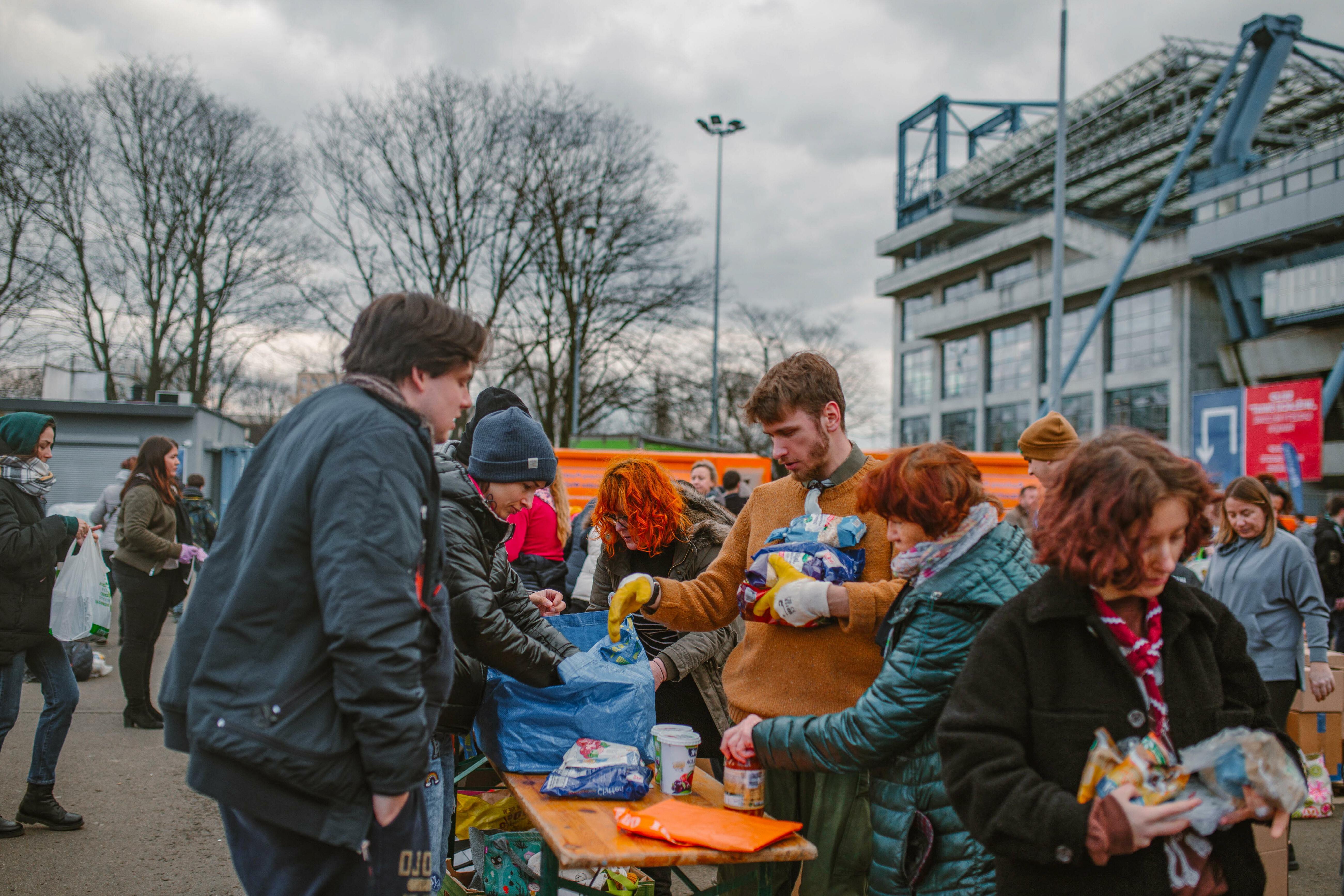
for Ukriane
Guiding Service
Polish Scouting and
EDITORS: Marta Jeżak, Anna Botor
TRANSLATION FROM POLISH: Mikołaj Martynia

PROOFREADING: Aleksandra Guzik-Kobiela, Ewa Lachiewicz-Walińska
PICTURES: Kamil Jasiński, Agnieszka Madetko-Kurczab, Konrad Kmieć, Julia Jurek
GRAPHIC DESIGN: Katarzyna Stanek
ISBN 978-83-65255-41-9 © 2022 Związek Harcerstwa Polskiego – Główna Kwatera ul. M. Konopnickiej 6, 00-491 Warszawa
Printing - ECARO/PCA20225620 being funded by UNICEF
Warsaw, November 2022
Polish Scouting and Guiding Service
TO HELP OTHERS WILLINGLY for
Ukraine
ZHP carries out activities co-financed by the National Freedom Institute Centre for Civil Society Development from the funds of the Scout Movement Development Governmental Programme for 2018-2030.
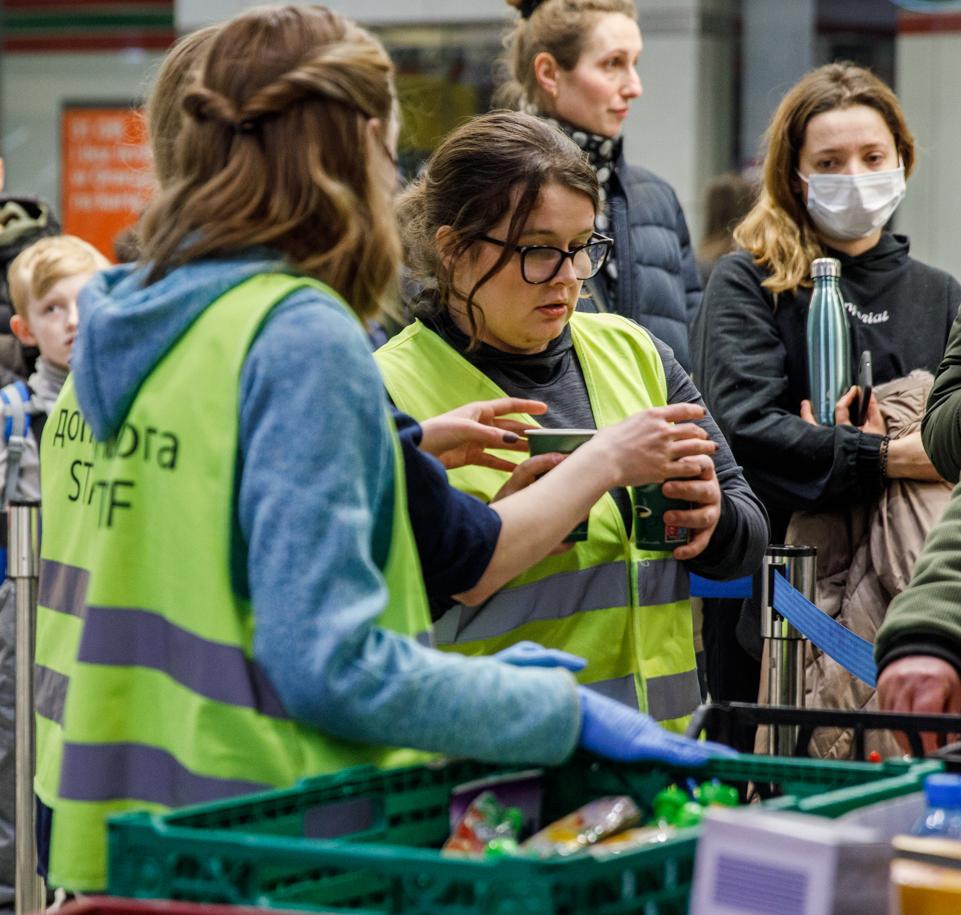
Someone asked me one day how it happened that so many scouts and guides set off to serve and how it happened that they were really the first – the first at the border, the first to organise their actions, the first to help. After a moment of reflection, I replied that it was thanks to our everyday work with the children and young people in the Polish Scouting and Guiding Association (ZHP). This service was a natural thing for us – despite it often being extremely difficult mentally and physically. When we see that someone needs our help, we just give it.
In this short publication we have collected stories about our service for Ukraine, which has been going on continuously since February.
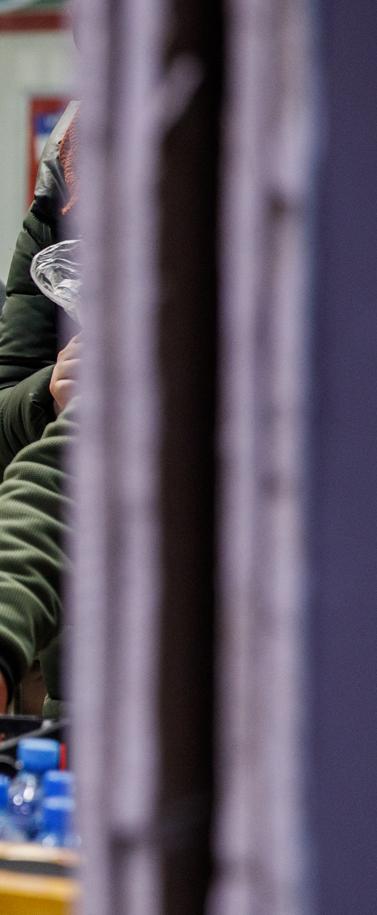
I would like to thank everyone who has been involved in helping our eastern neighbours. Both to the scouts and guides, and to our partners, thanks to whom we were able to carry out our actions even better.
Our service continues but I hope that soon it won’t be needed anymore.
Be

prepared!
Czuwaj! Chief Commissioner of ZHP
5
HELPING AT THE BORDER
At the beginning there was a great mobilisation – everyone rushed to help. Some people decided to go to the border. Despite all the adversities, they served – and the service was sometimes difficult and demanding, both mentally and physically. But the “Дякую тобі” (thank you) and, more than once, the tears in everyone’s eyes gave the strength needed to keep guard.
On the first days after the start of the war we joined in the action of gathering first-aid kit equipment conducted by the Cor Ignis Foundation in Piotrków.
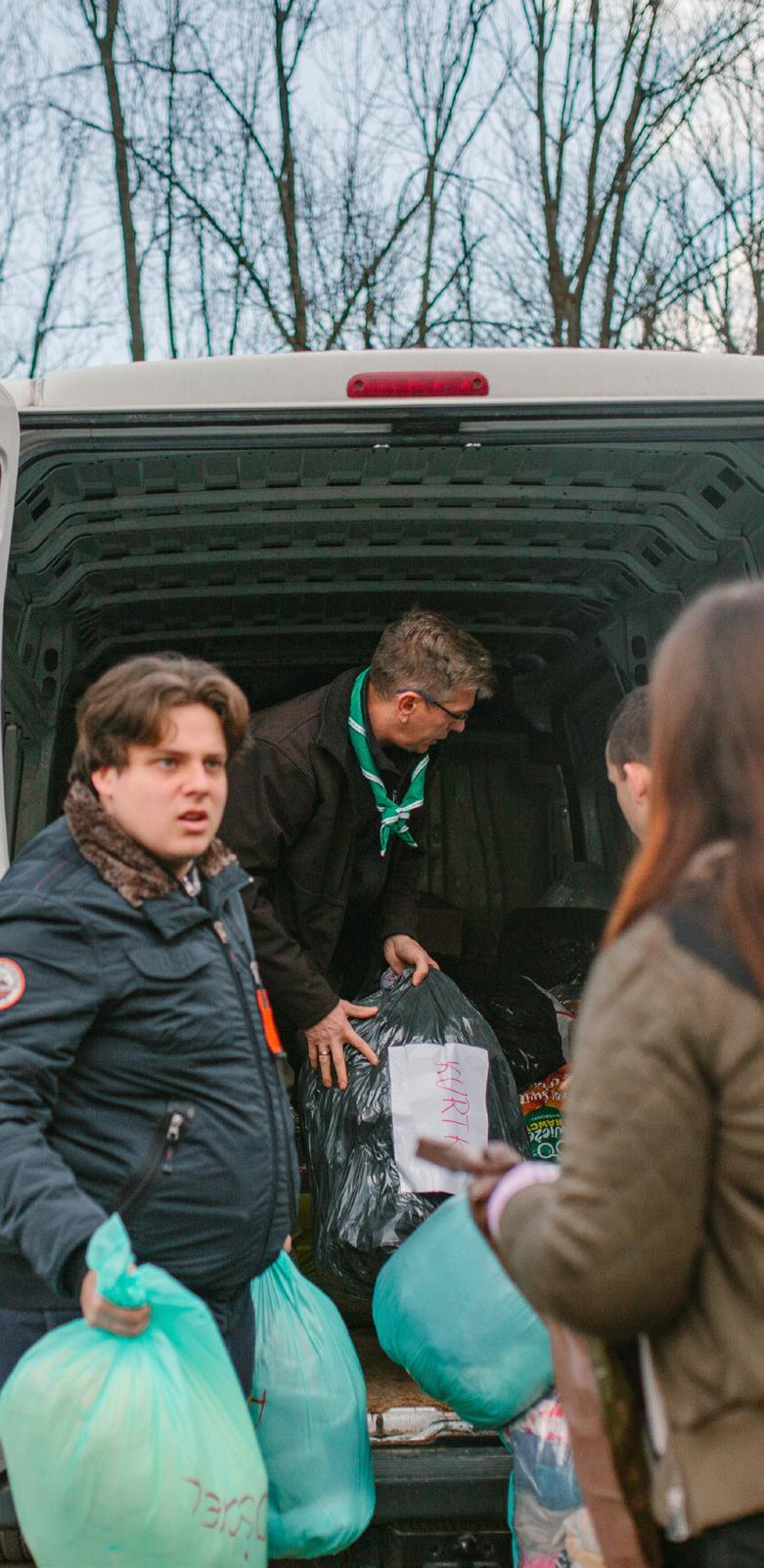
Mostly, however, I remember the actions I took part in at the border. I applied to be a member of the 8th and the 15th shift of the “Border” Troop. On the first night during the 8th shift I was helping at the train station in Przemyśl in the room for mothers with children. The next few nights I spent in Medyka in the warehouse where all the donated gifts were stored. During the 15th shift I was helping in the humanitarian centre set up in the building of the former Tesco store. There, in the sleeping area, I made sure the beds were clean, I wrote down the number of occupied and free beds, I also helped in the mothers’ common room where my job was mainly to support them by having conversations and taking care of their children. The mothers were eager to give me their children to hold in my arms, so that in the meantime they could prepare food, change another child’s clothes or go to the bathroom. I also assisted in the registration process, looked for bus and train connections, and redirected families to their temporary new homes.
Families felt a great need to talk. Younger people, who could speak English, told me a lot about themselves, their families and where they came from.
The “Border” Troop showed me the reality of the problems of the current world, gave me a new perspective on the service and the feeling that I, as an individual, can have an impact and change the reality surrounding us. “Border” is a combination of heavy emotions, hope and many volunteers with wonderful hearts. This combination will stay with me forever.
Ewa Małecka Puławy District Lublin Region
6
When the war began, I immediately contacted the Volunteer Fire Brigade HQ (I have my scout troop’s room there) to plan the actions together. We organised a donations collection and after less than a week we sent two lorries to Przemyśl. Then the “Border” Troop initiative was launched. My district sent two rovers on a kind of “reconnaissance”, they took part in the first shift. Me, my brother and a friend went on the 2nd shift. It was an amazing experience, from the very arrival at the train station in Przemyśl until the start of the first night shift, I was accompanied by powerful emotions that are difficult to describe. Finally, when it was time to leave for Medyka, we managed to fit all the shift members into two, maybe three cars and went to the border crossing. It wasn’t until I got there that I realised the size of the tragedy, the television did not show everything that was going on. I was assigned to the catering position, I made tea, coffee and “cocoa”, which was two spoons of instant cocoa drink with hot water, not milk, because there was no milk – but the refugees liked it. We were giving away about a thousand cups of this mixture per night. Two situations struck me the most: the first one was when I met an old lady who started crying in fear when she heard the siren announcing the change of border guards. As it turned out, she escaped from Mariupol. The second situation was meeting a married couple who were fleeing to their daughter in Poland. As buses came rarely, we spent about an hour and a half together talking, they said they wanted to go home as soon as possible. The next day, I read on the Telegram that their city practically ceased to exist. A lot more happened during these three nights of my service. When I came back, I needed a week to unwind before returning to my normal life.
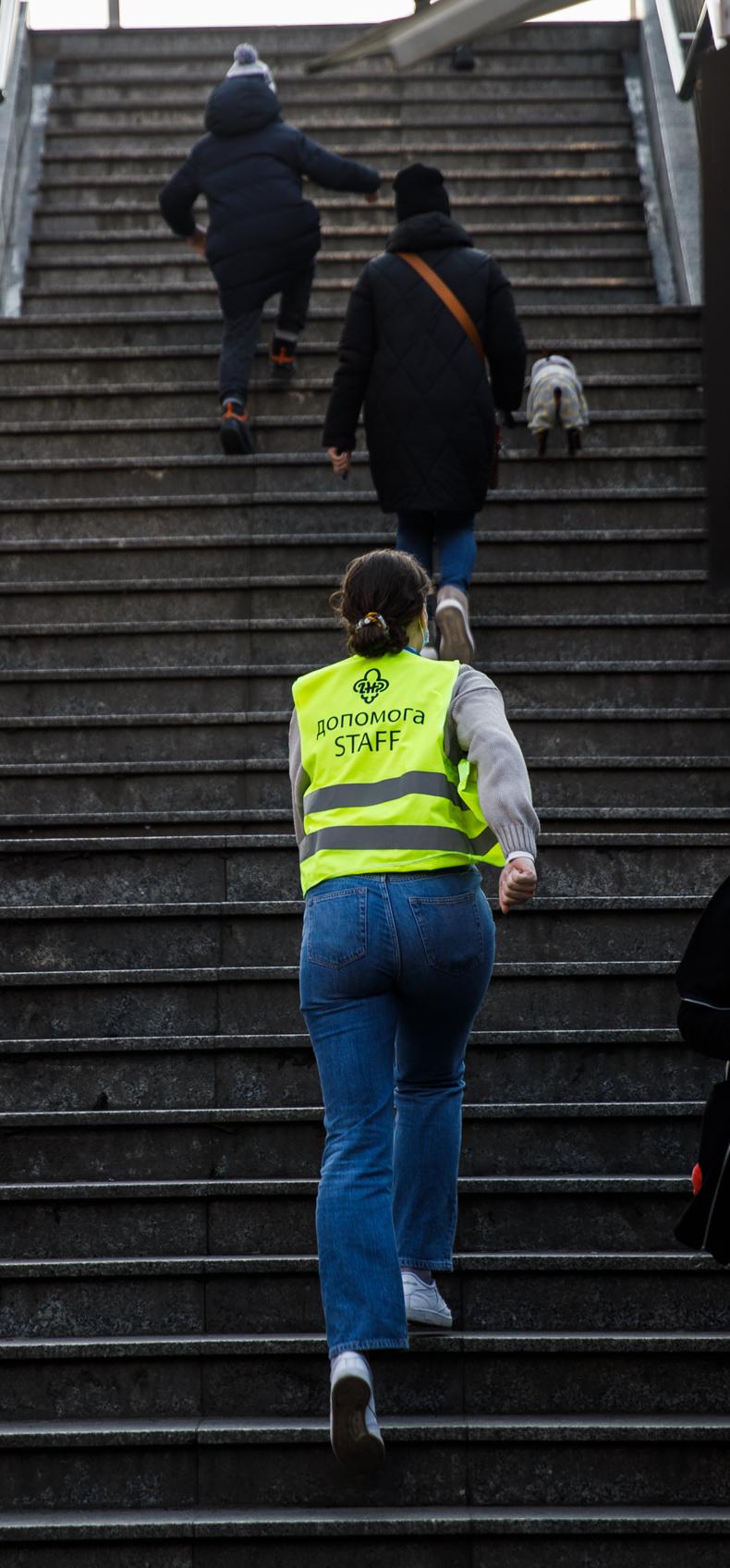
7
Kamil Przybyła Wodzisław District Silesia Region
We served in the Tesco humanitarian centre near Przemyśl. We were the first shift of the “Border” Troop to take care of the place, which meant that we had to plan the vast majority of actions ourselves. We created a system that guaranteed safe and relatively quick organisation of transport for families, groups and people who came by bus straight from Medyka. We collected data from the drivers registration system and looked for people who wanted to be transported. This was to prevent abuse and situations in which drivers would pick up people and then leave in an unknown direction. We were running around the building, often looking for transport for several groups at the same time. We also gathered and lead groups to buses that were provided by the fire brigade.

It was one of the most emotional events of my life, if not the most. The amount of help that was offered exceeded my wildest expectations. Knowing how many people found transport and accommodation thanks to our help compensated the extreme level of physical and mental exhaustion.
Part of my service was going to the border as a member of the Kuyavia-Pomerania Region’s team. I spent 4 days in Przemyśl, each night coordinating the activities of scouts and guides in the Humanitarian Aid Centre, the so-called “Tesco”.
It was a demanding and difficult job. First of all, the number of refugees and problems that piled up was overwhelming. From the lack of documents and not knowing the language, to the lack of free seats on trains and buses. Nothing would have worked, if it wasn’t for the scouts and leaders who served there with me.
The service for Ukraine was “service” in the true sense of that word. Despite many difficulties I believe that it was a necessary and valuable action. My feelings and emotions range from uncertainty and stress, through energy to act and the feeling of being part of something amazing, to fatigue and satisfaction after leaving Przemyśl.
Sokołowski Krakow-Podgórze District Krakow Region
8
Tomasz
Piotr Brzyski
Płock District Mazovia Region
I had the opportunity to help at the border crossing in Medyka and Przemyśl, at the railway station and in the old Tesco building converted into a night shelter. I decided to work night shifts every time. In Medyka, our service was primarily to meet the current needs, i.e. we provided hot drinks, quick snacks and hygiene products. “Tesco” (this name was used to describe the shelter among the volunteers) was a place where refugees could get information about transport further into Europe and get some rest before continuing their journey. My duties included confirming bus arrivals, informing refugees about them and collecting information about the need for free beds. Tesco was also visited by people and organisations offering their help, e.g. private individuals offering accommodation or organisations providing a decent start in other countries.
At the train station in Przemyśl, scouts and guides had tasks such as providing help with finding platforms, carrying luggage and helping in the room for mothers with children. This room was stocked with hygiene products, baby food and toys. The volunteer’s task was to assign beds, change disposable bedding, as well as watch departure times and wake people up. The main task of the scouts and guides at the station was helping to carry the luggage and that was what I did most of the time. I must admit that a cultural difference was a big surprise for me – some people from Ukraine didn’t want a girl to help them carry their luggage. Despite good intentions and the fact that I have a lot of strength, I often heard “Ne! Malczyk”.

Service, despite resulting from dramatic events, brought me fulfilment. One can often hear that the service at the border was a big burden for someone, mentally or physically. I do not question these words, everyone is entitled to their own feelings. For me personally this service provided a sense of accom plishment. It allowed me to discover the path I want to follow in life.
Karolina Wyleżol Żory District Silesia Region
9
I spent less than a month at the border in Przemyśl. My first service was at “Tesco”. I stood at the checkpoint where we scanned refugees’ barcodes and matched them with registered drivers. We wanted to know where they were going. Thanks to this system, the drivers and citizens of Ukraine left a trace and we knew where to look for them. The transport to Germany was the best organised — everyone was previously registered on the list, then we let them onto the bus one by one. Unfortunately, not all the transits went so smoothly. Sometimes drivers would wait for people interested in their offer up to 12 hours, they were so willing to help even a little. We met so many people who were lost and didn’t know what to do next. They wanted to go to Germany but they had no family or friends there. The last family I managed to find a driver for was the most memorable. The children reminded me of me and my brother. The siblings had been traveling with their tired mother for days. We scanned the driver’s code, children’s and mother’s codes, selected the appropriate seats and watched them set off into the world. I was particularly touched by this family because I imagined that I could be such a girl and my brother could be that boy. But we were born in a different place and we can sleep peacefully while these children do not have this privilege. There were millions of stories like this one. In “Tesco” you could
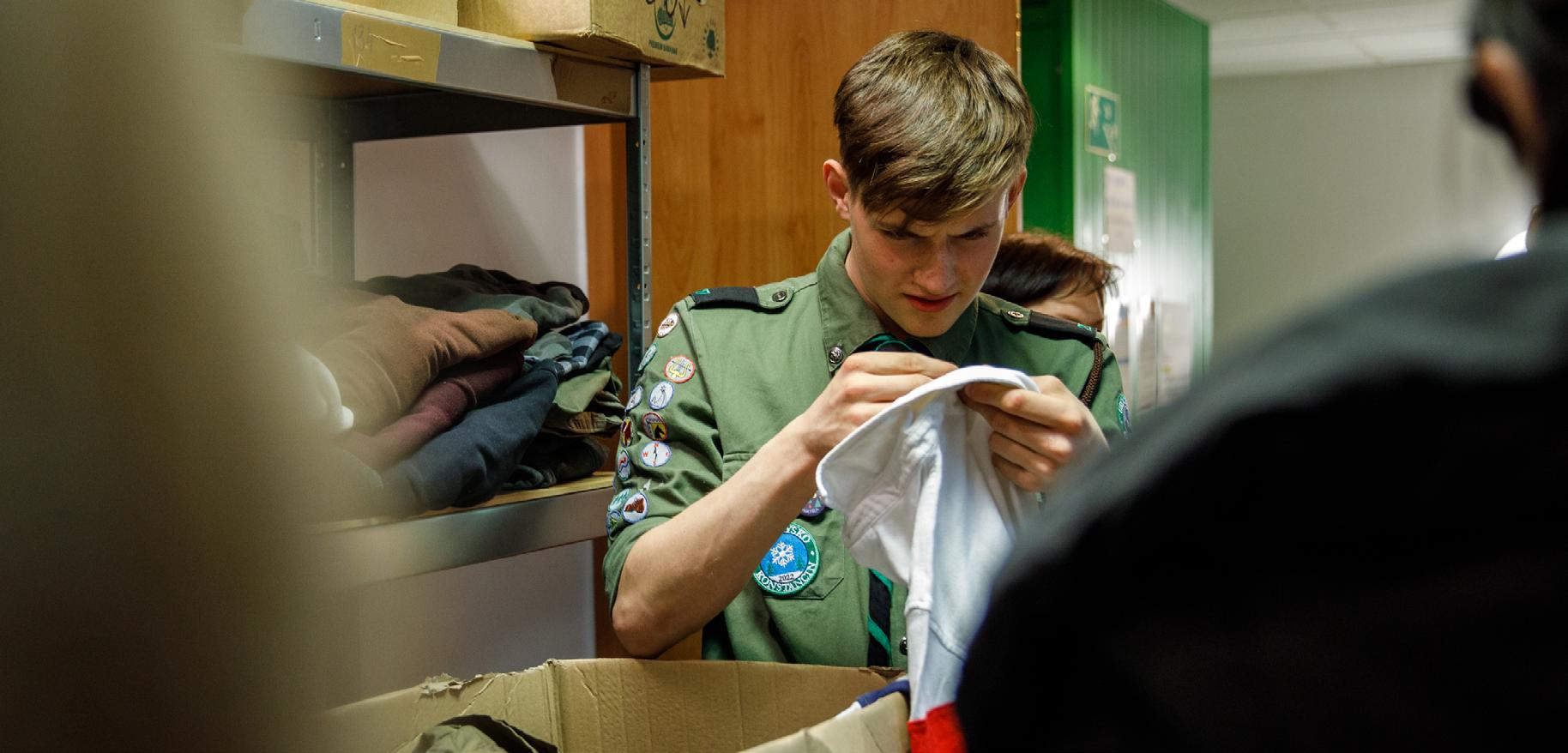
meet people from all over the world – volunteers from Canada, Ireland, Italy, Germany, Norway, I could keep on naming the countries.
I also served at the railway station in Przemyśl. I took care of the room for mothers with children. It was a lot of work, but nothing has ever given me such satisfaction. The room was often overcrowded, and the mothers were finally able to sleep for at least a little while, it was obvious how much they needed it. One night, a two-week-old baby was crying and crying, waking up the others. Its mom was nowhere to be seen, so I decided to hold the baby in my arms. The child fell asleep. It turned out later that the mother was sleeping right next to the child – she did not wake up, she was this exhausted after the journey.
The service showed me what we really strive for in scouting and guiding, how well the system of small groups works. It opened my eyes, made me realise that I want to create a better world through my actions, I want to become a psychologist so that in the future I can help children who have experienced the nightmare of war.
10
Zofia Stroińska Poznań Nowe Miasto District Wielkopolska Region
We carried out actions at the railway station in Przemyśl from the very first days after the outbreak of the war in Ukraine, we took care of the mothers with children that stayed in the temporary shelter organised there. Over time, we also began to serve at catering points and on one of the platforms at the railway station. In the following days, our exemplary service resulted in the city authorities entrusting us with tasks consisting of performing duty in the night shelters set up in Przemyśl schools and in several city warehouses. At the same time, we started our service at the border crossing in Medyka. Our activities consisted of a 24-hour shift at the catering point. After establishing the Humanitarian Aid Centre in Przemyśl, we also started our activity there, which involved registering the refugees, cleaning, logistics related to transport into Poland or to other European countries, as well as providing information to the newcomers. At the peak of our activities, during a 12-hour shift, over 90 scouts and guides from all over Poland were on duty. Over the course of over three months from February 24th to the end of May, nearly 1,700 scouts and guides from all over Poland were involved in the service in Przemyśl and at the border crossing in Medyka.
I returned home to my family more that three weeks after the start of the conflict. During this time, along with other scout and guide leaders involved, I was sleeping just a few hours a day in the district office on a foam pad in a sleeping bag.
Moments like this give real meaning to what we believe in: service, friendship, selfless help to others. These are not just words spoken during a campfire chat but real actions that helped save many lives. We passed the test of being loyal to our ideals.
Remigiusz Łuc Przemyśl District Subcarpathia Region
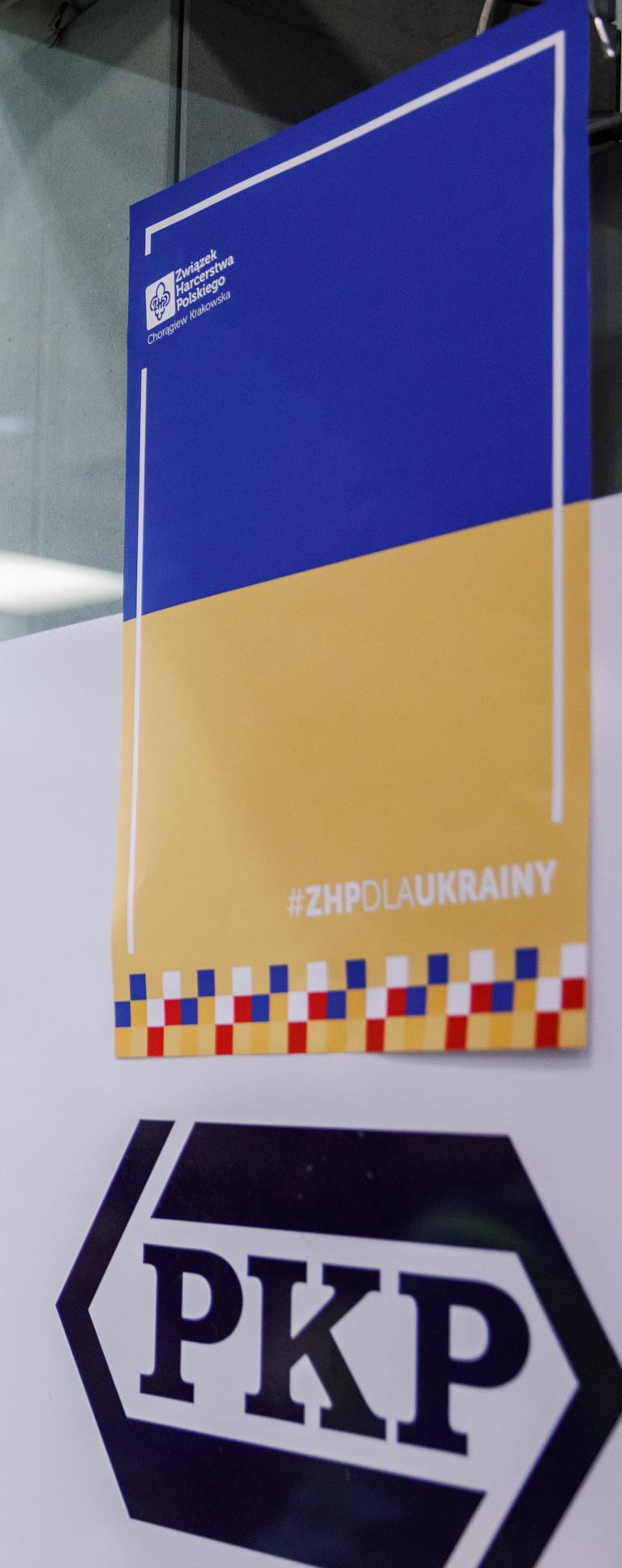
11
My service consisted of entering data from documents and handing out wristbands. I was also responsible for cleaning the rooms where guests stayed. Sometimes I also helped organising transport and departure of the refugees further into the country.
During my stay at the “Tesco” humanitarian centre, I was in a “service mode”. I knew I was there to help. But when I got home, I sat down and cried. After that I started helping in my hometown and I served at the Central Railway Station. I try to help and serve all the time, whenever I can.

12
Isabela Stach Milanówek District Capital Region
“Lots of emotions, great people” – this sentence perfectly describes the time I spent in Przemyśl and the amount of stimuli that came from emotions of the people that we encountered, these often extreme emotions ranging from piercing sadness and confusion to happiness and incredible gratitude. And then there was us and our emotions. So many great people ready to sacrifice money, food, knowledge, skills and, most importantly, their time to help other people.
Jagoda Banaś Oława Ditrict Lower Silesia Region

13
Just after the outbreak of the war, two scout leaders from my region that were already in Przemyśl asked if there was anyone else who could come to help. I packed myself the same day. It took me about 2 hours because my hands were shaking from the stress. I didn’t know what I was going to do there and I didn’t know anyone, but at the same time I felt that I wanted to go and help.
The first thing I saw was a train station full of people – I’ve never seen anything like it. In the district office I met some amazing scout and guide leaders who were taking care of everything in a fantastic way. I did all sorts of things: helping at the railway station, at the border crossing in Medyka, at „Tesco”, at schools adapted for shelters, I made sandwiches, worked in the warehouses – there was probably nothing I wouldn’t do. I came all alone and worked with a different patrol every day, and thanks to that I met a lot of scouts and guides from all over Poland.
I’ve never felt such power before. I could stay up for 24 hours and still have the energy and without feeling tired at all. We were constantly accompanied by a lot of emotions, both positive and negative at the same time. I don’t think I’ve ever stayed outside in cold for the whole night and not freeze simply because I was so into what I was doing. I have probably never seen so much positive energy, never have heard so many heavy stories. Even when there was a moment of free time, we were still wondering if there is something else we could do, e.g. when we were standing in Medyka at the border crossing, we started giving out sweets to people who had just arrived, so that they would feel a little better. It was the first time I felt touched by giving someone a cookie. It was one of the most amazing weeks. I was terrified as I was driving there, but I’m sure it was worth it. I left thinking I would definitely come back. Then I came again as part of the „Border” Troop. It was worth it.
 Maja Florczak Opole District Opole Region
Maja Florczak Opole District Opole Region
DONATIONS COLLECTION
After a while, we as an organisation understood that it was not a sprint but a marathon and that we had to run it together. The service took many forms – and they were getting more and more organised. One of them was donations collection, which were taking place almost all over Poland.
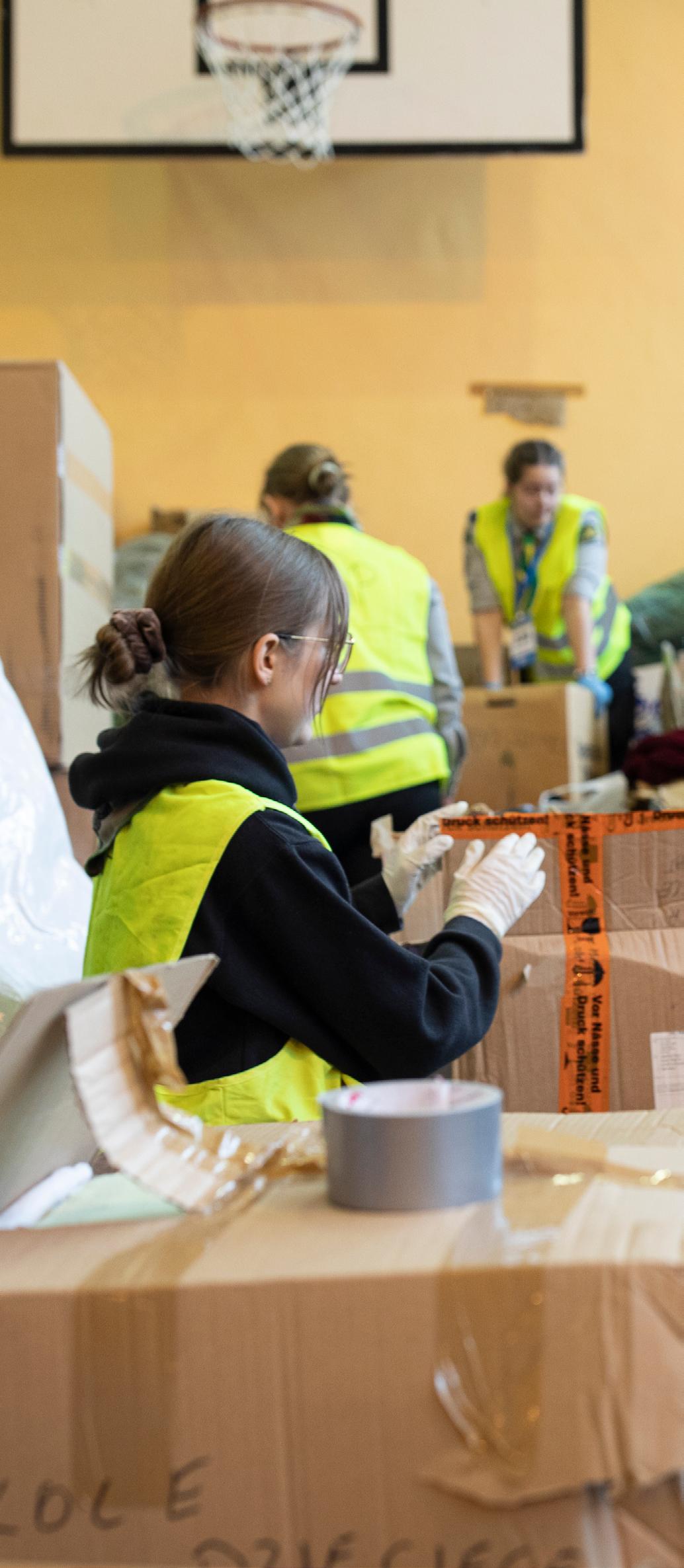
Mazovian scouts and guides were among the first ones to join in the preparation of individual first-aid kits for Ukraine and articles necessary for first aid. They launched a special campaign “First aid kit from ZHP”, under which a thousand first-aid kits were prepared. One of the local companies sewed a case, then the collection of bandage materials and other articles necessary for first aid was carried out, which were then used to complete first-aid kits for Ukrainian soldiers.
The collection of materials was carried out all over Mazovia. The scout and guide leaders used this action as a training and program opportunity in their local communities. In exchange for the collected dressing materials, our districts offered to train on how to use them, e.g. they organised first aid workshops. The whole action was carried out under the slogan “Good for good”.
The situation in Ukraine affected all of us. Everyone wanted to feel needed and be able to help, which is why the idea of service for the youngest was born. When rovers, rangers and leaders were busy preparing first-aid kits, cub scouts and brownies were preparing hand-made cards with greetings and words of encouragement, which were added to the first-aid kits.
Anna Wasilewska Mazovia Region
We have been carrying out scout district activities as part of the “Help for Ukraine” campaign from the 26th of February 2022 until today. Throughout this time, in our district office there has been a donations collection and distribution point for refugees staying in our area, it’s mostly single mothers with children. They can collect the products they need twice a week. At first, from March to June, we worked in the “Weltom” factory hall that was made available by our sponsor, in which we took care of receiving shipments from England and Germany. We used this place to segregate the gifts and prepare humanitarian transports to Ukraine. We managed to send a total of 13 transports to cities such as: Kyiv, Jagodin, Maniewicze, Lviv, Kherson, Tarnopol, Kowel, Dnipro. We also prepared help for soldiers fighting on the Donetsk front (bulletproof and tactical vests, firefighting boots, gas masks, batteries for drones, thermal underwear, sleeping bags and mats). Moreover, we went to the town of Hinwil in Switzerland where gifts were being collected and we worked closely with a similar group operating in Wrocław.
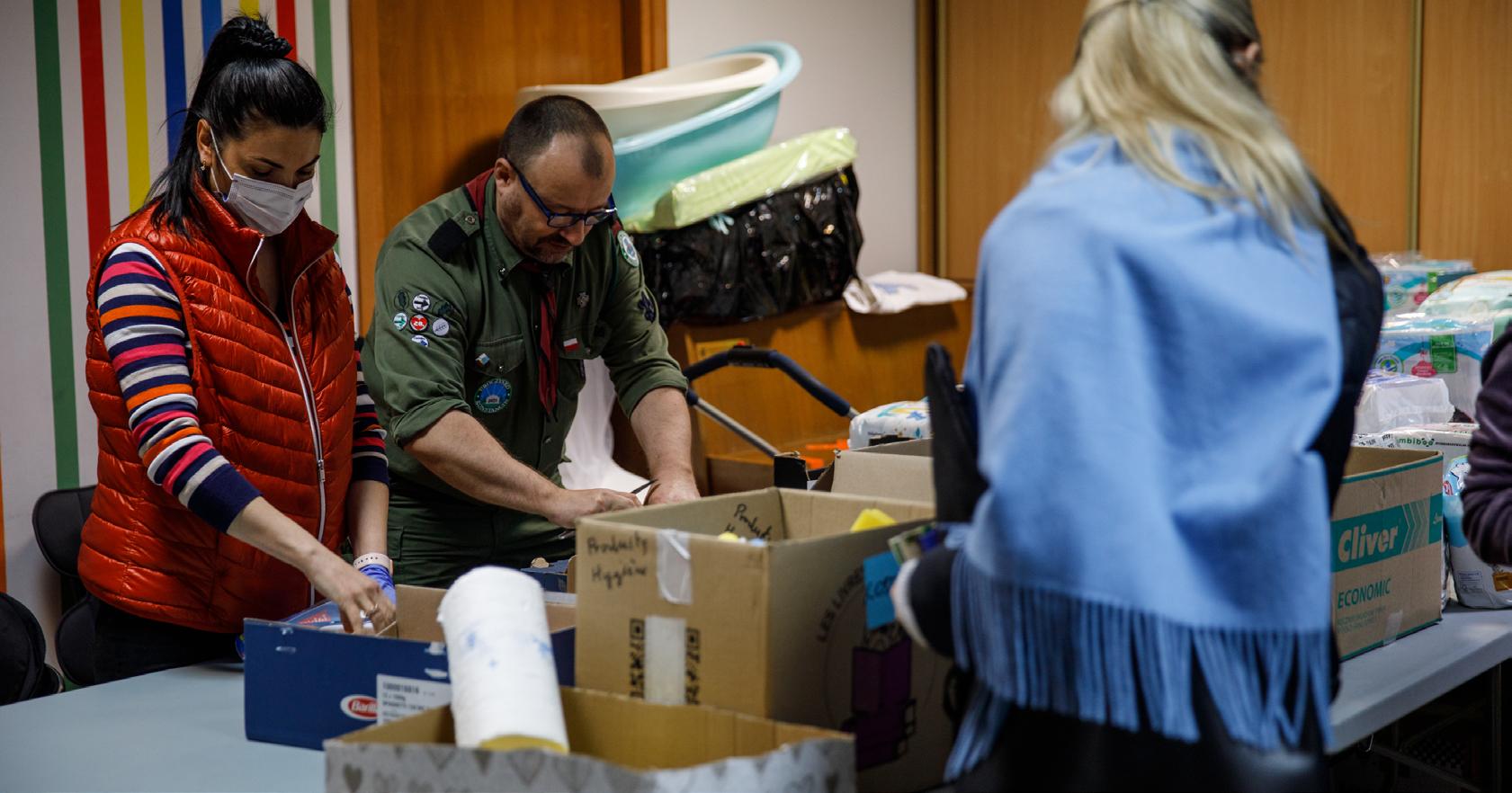
We organised transport by private cars for people who came to the reception points at the border crossings, we searched for apartments and helped refugees settle in. We also helped them with contacting offices and aid centres, and with finding new jobs. At the same time scout and guide patrols from our district participated twice in the service at the border. We also helped a professor of the University of Kiev to leave the city while it was being bombed – we found transport and paid for it.
This service was essentially a need to help others. Close business ties with Ukraine made the refugee exodus very personal to me. This was a trigger for me to help in a number of ways. Despite the fact a few months have passed, we are still carrying out these activities. Service.
16
Bogdan Smolarek Tomaszów Mazowiecki District Łódź Region
From the first days of the conflict, the scouts, guides and leaders of the Zamość District started collecting mascots and clothes at first, and then food, toiletries, dressing materials, blankets and sleeping bags. We set up a warehouse at the scout district office, from which sent out the collected donations to, among others, the reception point or directly to the border (PHA, organisations distributing meals). We also organised transports of donations to Ukraine.
Older members - rovers, rangers and leaders were on duty at the reception point. Scouts and guides in the shelters took care of younger children. As more and more refugees arrived in Zamość, we transformed the warehouse into a distribution point for the collected articles. The point at our district office was in operation until the end of May. In April, we opened a second help point in Zamość, at ul. Błonie 4. It’s been operating to this day. On average, it helps 150 families
a week. We are constantly looking for sponsors and donors to make this possible. We run a continuous food collection at the Kaufland supermarket. We maintain contact with several Ukrainian families. Together, we organised culinary workshops, allowing our scouts and guides to get to know Ukrainian specialties. We cooperate with foundations supporting refugees.
In the beginning there was chaos, a great need for action and fear of the unknown. With time, it all settled down and the service turned into well organised and systematic, which brought measurable results.
From the beginning of the war in Ukraine I was responsible for collecting donations for refugees. I tried to fulfil this task as honestly as possible, as it was entrusted to me due to the function of the plenipotentiary for public collections in the Gdańsk Region of the Polish Scouting and Guiding Association. The enormity of the needs and the huge response from the entire province forced me to engage a large number of staff to operate warehouses both in Gdańsk, and in the district centres of the Pomeranian Province. This situation showed the power scouts and guides have and the level of trust we are given. Both ZHP members and volunteers from outside the organisation volunteered to segregate and distribute packages in all the points. It showed how much power we have when we work together! I cannot count the number of packages sent out, but I know that thanks to the work of volunteers taking care of the refugees was exceptionally well-organised. In addition to handing out packages, we cooperated with over a dozen gastronomic centres to provide hot meals to all the people who came to us, and we also provided our guests with packed lunches for their next trip. This relay of good deeds showed the kind of community we are. An example of that is a volunteer who, despite having her high school final exams this year, stayed
with us all the time. She bravely combined studying for her final exams with the activities performed as part of the service. It didn’t matter who we were, we were connected by the need to give help – service!
I wish this service wasn’t necessary, but, paradoxically, I am glad that the Gdańsk Region commands such great trust and that our service was readily supported by thousands of people and institutions – to me it means that we fulfil our mission well.
This service is not over. We are still working for those who trustfully stayed with us. Of course, we took special care of those who found themselves in our care for longer in the centres we run. We have been helping them to find new jobs, learn the language, take care of their children. It’s not over - it’s ongoing and we’re still working, even though we had to get back to our daily responsibilities that wouldn’t wait for us.
17
Sława Bilska Zamość District Lublin Region
Ewa Deręgowska Gdańsk-Wrzeszcz-Oliwa District Gdańsk Region
Rangers and rovers from the 14th Team „The Incredibles” have been involved in service for refugees since the outbreak of the war in Ukraine. We took part in numerous actions of loading and unloading the assortment, segregation of clothes and food, and we also helped in the preparation of packages for families. This service was quite a challenge for us because we had to learn to reconcile our everyday duties with being engaged in the service that required time commitment. The whole action brought us a lot of satisfaction and joy that came from working together for the benefit of those in need.
We were all very determined to participate in relief activities as often as possible. Each of us had the feeling that our participation was really needed. We were happy to help. We felt we were in the right place.
Roksana Jankowska
Inowrocław District Kuyavia-Pomerania Region
After the outbreak of the war, our leaders and willing members of our scout and guide district began collecting food, clothes and necessary articles for refugees and soldiers fighting abroad.
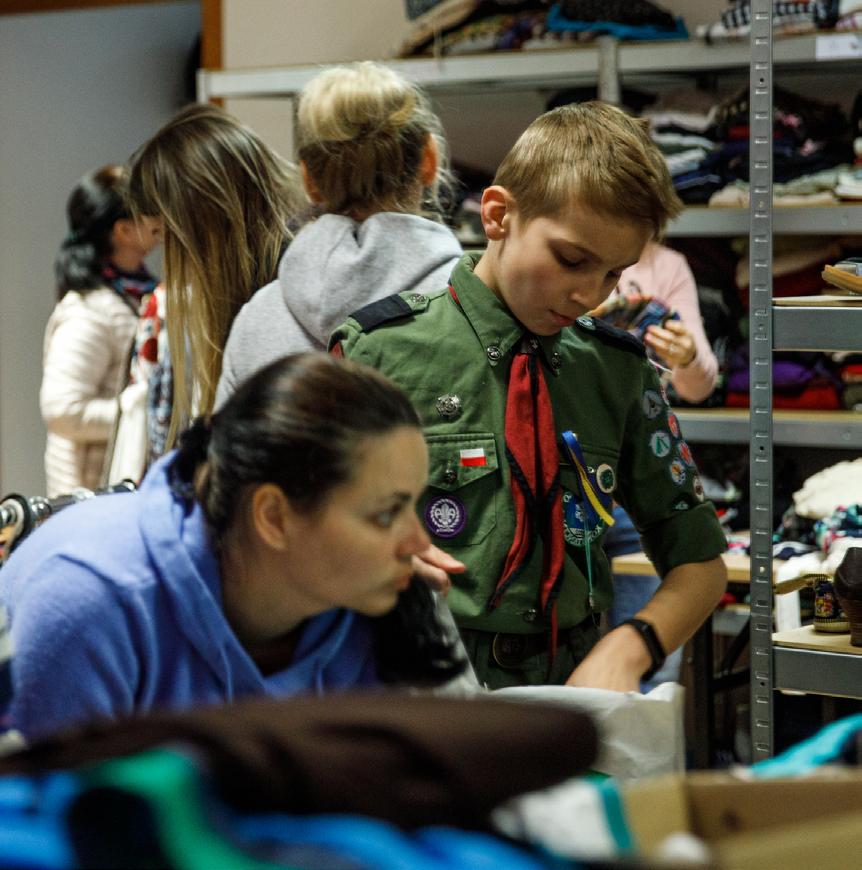
Our service was not limited to this. In addition to collecting donations, we also conducted regular Polish language classes for children with parents from Ukraine – amateur tutoring that would allow them to communicate in a foreign language. We started by putting up announcements, informing on social media, and then we conducted classes and played games.
Helping others is indescribable, as well as the reaction of people who receive it. That’s what we are for – to spread such attitude in the world and contribute to someone’s happiness.
Marika Tomasiak
Goleniów District West Pomerania Region
We held a collection of food and necessary products (such as hygiene products, diapers, etc.) in one of our rooms. People could come to our collection point during our daily shifts and leave things that we then sorted and prepared for shipment. I believe that thanks to the service I was able to show solidarity with our eastern neighbours, at least in a small way. I felt sadness, compassion, but I knew that our small gestures can do a lot.
Dawid Tarkowski Goleniów District West Pomerania Region
18
Eight-year-old Michasia (first grade) from the 3rd Cub Scout and Brownie Unit in Młodzieszyn got involved in aid activities for Ukraine. Michasia is an extremely sensitive girl and willingly devotes her time to others. As soon as the war in Ukraine began, worried Michasia wanted to help. She had the opportunity to do that in the local markets where donations collection took place in the form of donation baskets. For nearly two hours, Michasia watched over the baskets, never taking her eyes off of them. She was collecting the products from
shoppers, arranging them and checking every now and then with a glow on her cheeks how much was coming. Michasia received a chocolate from the store manager in recognition of her commitment, but she did not take it home. Without thinking twice, she decided to share it with others. This chocolate was also placed in the basket intended to support the citizens of Ukraine.
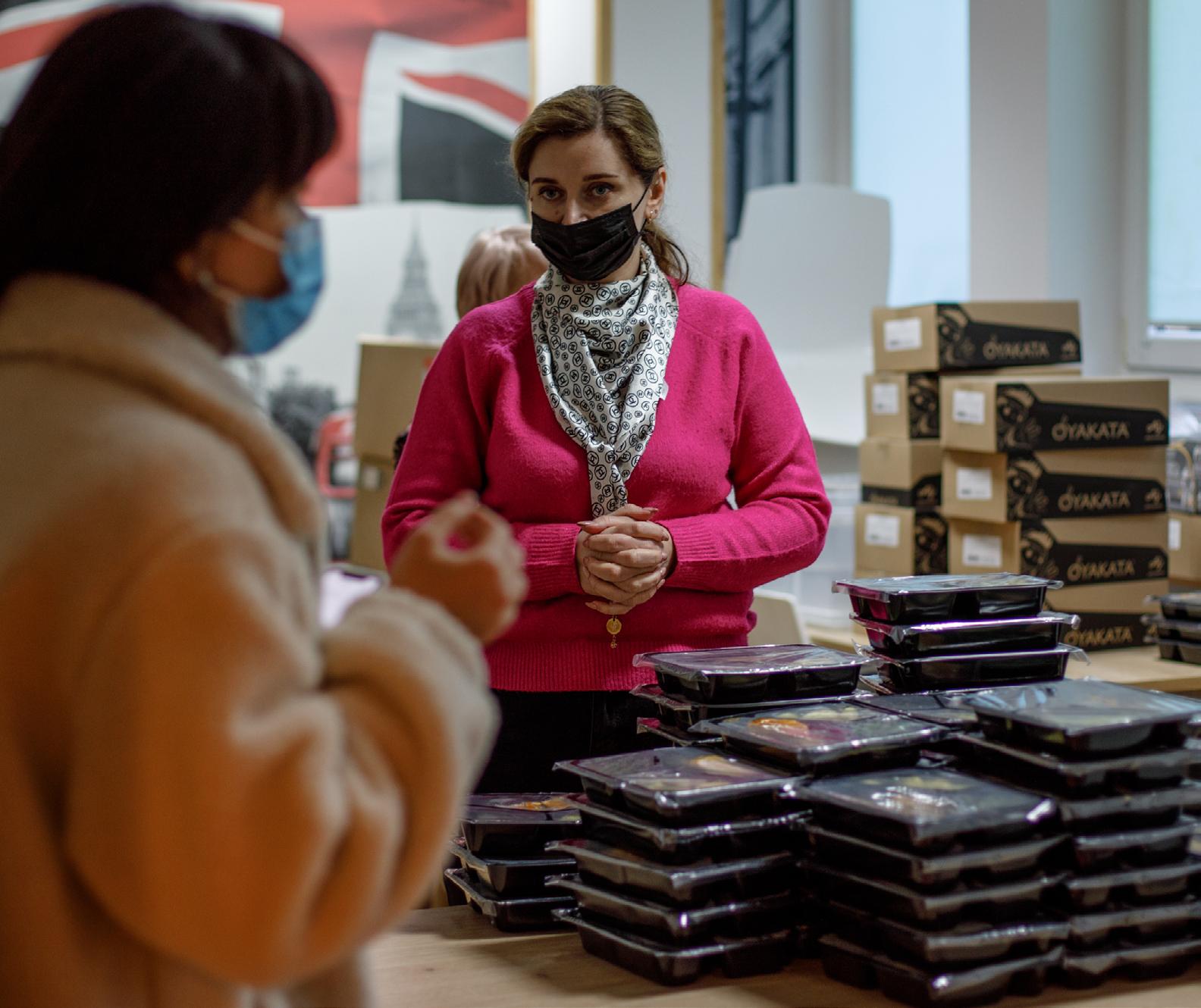 Anna Wasilewska Sochaczew District Mazovia Region
Anna Wasilewska Sochaczew District Mazovia Region
19
HELPING TO SETTLE IN
Many mothers escaped from Ukraine with their children who now needed to find someone from their age group. But the refugees were also looking for a place to stay – sometimes for a night, sometimes for a week, and sometimes they didn’t know for how long. And again, scouts and guides from ZHP were ready to help them settle in.

When the Ukrainians came to Gdańsk, they were lost, they had no place to live and often no luggage, food or money. They could find out where to look for help at the information points, e.g. at the main station where I was also on duty.
The second information point where I worked every day for over a month was the Scout House. It was the place where the Ukrainians could register with the border guards, get a place to stay and receive the necessary toiletries, clothes and food. During the hardest week there was more than 100 families a day who came into the Scout House looking for help – in order to avoid long queues the volunteers gathered them in the cinema room, each family with their own number waiting to be called out. It was often like this all day long, with a walkietalkie in your hand we made sure everything went as smoothly as possible. The service at the Scout House was very diverse. We did everything from playing with the kids, making coffee and tea, cleaning the warehouse, making sandwiches,
vacuuming the cinema hall, to keeping an eye on the check-in line. There was a lot of volunteers, everyone quickly found their field of service.
It was hard to watch the misery of people, older, younger, my peers. People just like us, deprived of the basic living conditions by the cruelty of war. To me, the service for Ukraine is the definition of readiness for action – of our motto “Be prepared!”.
Despite the lack of time, school and preparations for the final exams, me and many other volunteers managed to find a moment to come and help.
20
Dominika Romejko Gdańsk-Portowa District Gdańsk Region
The war broke out on Thursday, on Friday I was still at work, and on Saturday morning I was going, late, to the first meeting of my leader training in Łódź. In the afternoon, the quartermaster noticed that a collection point was needed, so he quickly gathered some people and prepared the ground floor of the scout and guide district office. On Sunday the donations collection started. I had not seen such a spurt among our members for a long time. The residents of the nearby blocks of flats also came in to help. In the meantime, I was at the training, answering calls from the crisis management at the same time, and I got in touch with some people from Łódź who were organising help. We contacted one of the orphanages that was preparing to welcome at least 30 children from Ukraine. By Tuesday, there was a bus loaded with donations going there. The willingness to help was huge, we worked with private individuals as well as companies that were ready to go to the border. All they needed to know was where they could get things.
I spent the following days sitting in our district office, forcing volunteers to rest over tea or coffee, contacting the points at the border in order to find out what they needed. The bus that was going to the border with the donations came back with refugees and that’s how the first people in need of help appeared in our county. Together with the municipality office we organised packages for those families. Sometimes they would come to our district office to look for something among the clothes we have collected. Soon, we were also helping to prepare places in hotels. Scouts and guides helped in delivering bedclothes to the rooms, we also rented our camp beds. Additionally, more than 80 mattresses were lent to the State Fire Service, who prepared accommodation together with volunteers in their common rooms.
I felt happy to help. I also felt great pride in how committed my scouts and guides were. I met many wonderful people. It also allowed us to show our local partners that we are a responsible and noteworthy organisation.
 Suder Końskie District Kielce Region
Suder Końskie District Kielce Region
21
Jacek
On the first day of the war, we sent an e-mail as the Lublin ZHP District to the Lublin City Hall, informing them about our human and equipment resources. The next morning I received a call from the City, they asked us to share the equipment we use during our summer camps. I harried off from work and within a few hours we organised a group of scouts, guides and leaders, who loaded and distributed about 250 sets (a camp bed, two blankets and a mattress) alongside the people from municipal services. The first groups of refugees appeared in those locations where we set up our camp beds. Hour after hour and day after day, the calls from the Crisis Management Department were more and more often, regardless of the time of day, and we as scouts and guides rose to the challenge.
In order to make our actions more organised, we established a crisis team of twelve people in our scout district and divided the areas among ourselves. We also joined the Lublin Social Committee for Aid to Ukraine and took on the role of volunteer coordinators in accommodation places and at the bus station. In the Eventually, we were coordinating one of the points for 44 days and each
and every day we cleaned, changed the bedclothes, gave out the food and took all kinds of actions to make it better for those who stayed there.
Being conscious educators, we also tried to enable the eager younger members, even cub scouts and brownies, to take part in the service. We organised many donations collections among our units and prepared packages that were delivered to children fleeing from Ukraine. The culmination of our service was organising the Easter party. We organised a collection of baskets and decorations, cooked and baked traditional Easter dishes so that the new residents of our city could meet at a common table and feel at least a tiny bit like it’s family holidays. This is how almost 10 weeks of service went on for the community of our scout and guide district.
I started my service at the station on the 28th of March 2022. Throughout my time of service, I met many people in various conditions, from healthy to terrified, with new problems on their minds that appeared because of the war with Russia. There was no question that we would always give help to those who needed it. Together with the Provincial Office, other scouts, the City Guard, the Railway Protection Guard and the Police, we did our best to provide these people with everything they needed. Our job was to give out the basic necessities such as toiletries, food and dressing materials. We helped Ukrainians to get on the right trains, which opened the door for them to settle down in Poland. We were also responsible for checking whether there were any lost or frightened refugees in the carriages. We also helped them by packing their luggage into the vehicles of the City Guard, which would then drive them to centres in Białystok and its vicinities.
We cared the most about making them feel comfortable physically and mentally. We tried to talk to them often. I myself often acted as a translator from English. Some of the scouts and guides spoke Russian, or simply used an online translator or the support of a volunteer translator.
Regardless of the appearance, skin colour, religion or behaviour (and we had some uneasy situations), we wanted to help everyone. We did it whenever we could. After all, that’s what we were there for – to serve the Ukrainian society, to help them and to give them what they needed and still need the most – asylum and a safe place.
22
Angelika Karczmarz Lublin District Lublin Region
Maciej Knaś
Białystok District Białystok Region
I started my service at the Eastern Railway Station in Praga Północ on the second day of the war. Next to the station I saw crowds of people lost, scared, trying to get some information. Together with other people from the neighbourhood’s Facebook group, we started collecting donations, something warm to eat, blankets and sleeping bags, so that the refugees could wait for their next journey through the night. I would spend the day at the school where I worked, and then I slept for two or three hours at home, and I would go to the train station for the whole night – talking, informing, explaining, helping with getting a ticket or a place to stay.
Soon, the coordination of the Railway Station was taken over by the District Office of Praga Południe, with whom we created a full volunteer service, a website for volunteers was launched and everyone could officially sign up. The mobilisation of the people began to resemble an organised service. I coordinated many volunteer shifts as a leader – often on duty at night, three or four times a week. When my students and parents realised the kind of help that was needed, they decided to give their support – the children started collecting donations for animals at their school and its vicinity. Over the course of four months, we collected more than 1.5 tons of items for animals (food, leashes, sleepers, water, containers, care accessories and medicines). And the parents responded to every request we had.
My service at the station lasted for over four months. During that time I was the leader of volunteers, I survived the transfer of the helping centre that was organised in the glass station centre to a tent run by the City of Warsaw, and later NRC. The quality of the help improved when services such as the Police or the Fire Brigade joined us. Each and every day I felt how touched and proud I am. Proud of the Poles, of the Praga inhabitants, their sacrifice and bravery. Proud of our support and open-mindedness. I am proud of the fact that my pupils joined in helping and today they are great neighbours – colleagues. I feel joy – because seeing a scout uniform on a street or the train station evoked a smile and trust yet again.
We were on duty at the Polish Red Cross (PCK) medical point and at the railway station. After several weekends of cooperating with the paramedics from Tarnowskie Góry ZHP Paramedics Club, we started taking on unassisted shifts on weekdays also, thus taking some weight off the PCK paramedics’ shoulders.
We were accompanied by a feeling of helplessness combined with a lot of energy and willingness to act. Hundreds of human tragedies intertwined with the stories of the refugees and the people who decided to help. There were many moments of doubt that were blurred with each smile, even the smallest one, that came from someone who got the help. And there was also the sense of community, thanks to the scouts and guides who worked side by side with volunteers from various organisations (ZHR, PCK, Maltese Aid) and non-associated people.
23
Radosław J. Potrac ZHP Headquarters
Marek Laszczyk Tarnowskie Góry District Silesia Region
The “What a ride” action began completely by accident. The building where we ran a community store was full of children. One of them, Artyom, was especially helpful in carrying clothes and kept asking if it would be possible to organise a bicycle for him. I posted an inquiry to one of the support groups and immediately got a few messages that someone had bikes to give away, that they had been just lying around in a garage somewhere. I picked up the bikes and tried to fix them, but unfortunately the amount of repairs needed was too much for me. Then I found Piotr. Since May, Piotr and the employees of his mechanical workshop have collected and repaired about 200 bicycles that were then delivered to the refugees. This is how our cooperation began.
Since the beginning of September I have managed to acquire over 30 bicycles on my own. I am a committed cyclist, which made this action even more dear to me. To this day, I remember the smile of a tiny 2-year-old Marta who got her first balance bike. Of course Artyom, who was the reason it all started, also rides a bike, just like dozens of other kids and adults. The action continues, we still collect bikes, fix them after work, and then give them to their new owners. Some of the bikes we get are run-down, old and badly broken, but that’s okay! If they cannot be repaired, they can be taken
apart to save other bikes. “What a ride” is not only an action of donating bicycles, but also dozens of human stories that are full of gratitude for getting their own bicycle which gave them freedom, independence and brought a lot of joy. By getting to know the stories of these people, we try to help in many other aspects – finding a job, inviting them to cycling events, thanks to Gosia from “she&bike”, who cooperates on the action with us. We are still in touch with people who know those waiting for a bike, and they bring them to us.
The joy on the faces of children and adults is inde scribable. A bike gives independence and freedom, and it is one of the few things that these kids have for good. Since there are a lot of unnecessary bicycles lying around in garbage dumps and garages, let’s give these kids a feeling of freedom!
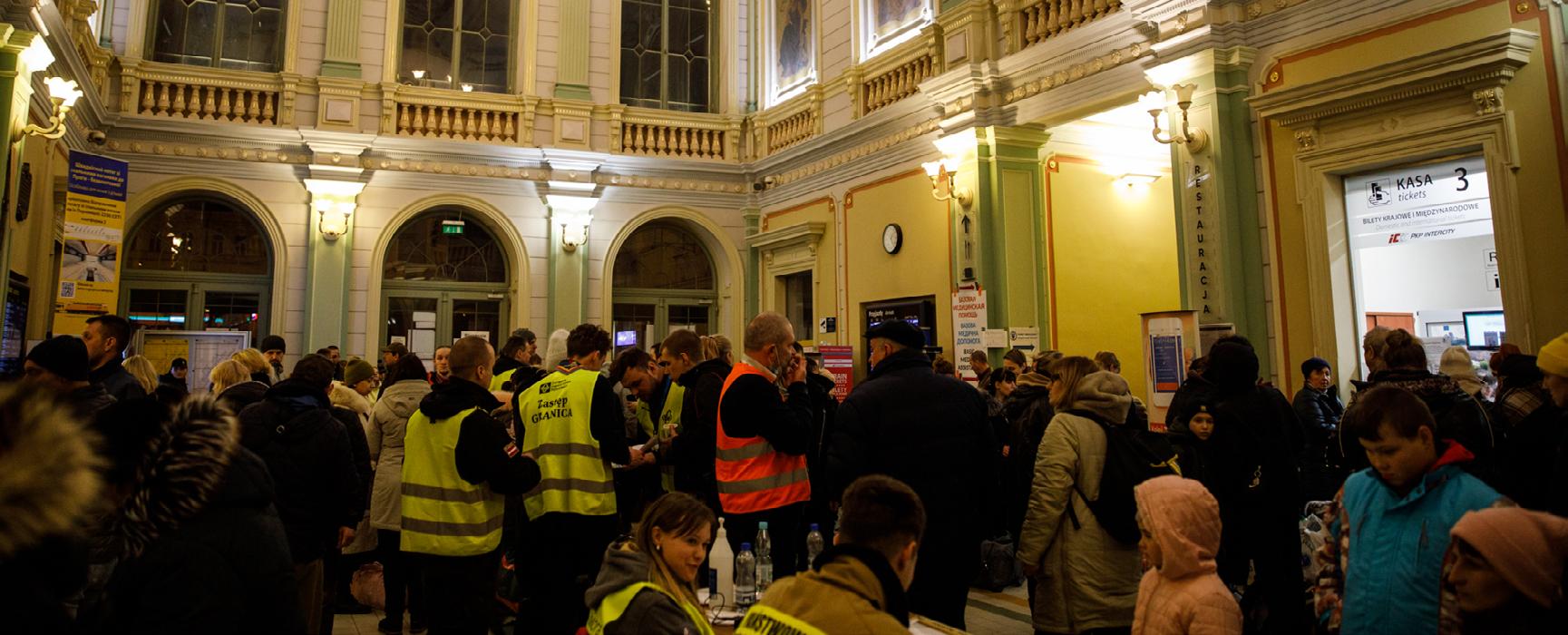
24
Dorota Limontas Warmiński District Warmia-Masuria Region
The help I’ve been providing the longest started by accident. Initially, I participated in such actions as picking up guests from Ukraine from the station in Łódź and directing them to shelters, helping in finding next trains, sorting things or organising medical supplies collections. It was during one of these collections of medical supplies that I met a woman of Ukrainian origin who has been living in Poland for several years. She was very worried because after the outbreak of the war a friend of hers came to her with her elderly mother. Her mother suffers from multiple sclerosis and is constantly taking medications to alleviate the symptoms and slow down the progression of the disease. During the conversation I said that I knew the situation related to multiple sclerosis from my own environment, but I also had been dealing with this topic as a scientist for several years. I immediately started wondering if there is something I could do to help.
I started calling up neurologists I know who specialise in this subject. It turned out to be harder than I thought, but I made it! I made a list of doctors who were willing to translate medical documents. Like a snowball, one person contacted me with another. That way we created a network of several good souls who could contribute to our activities. Initially, my task was to „receive” an information about a person in need, look for someone who could accompany me and the patient to the doctor’s appointment (it had to be a person who could speak both languages), arrange those appointments, and look for people who would translate medical records.
The activities were very time-consuming, but above all they were emotional. I felt responsible for every person, whom I started helping. It was very stressful, especially since there was a language barrier, and the barrier concerned specialised medical nomenclature. However, when the matter was successfully settled, I felt great joy and satisfaction. Each time there I was stressed about whether the person would understand me well, whether I would offend them in any way, cause secondary trauma. Service is something that accompanies me on a daily basis both in ZHP, and outside the organisation, but finding myself in such a new, alien and terrible situation as war, made me feel lost.

25
v
Kamila Smyczek Łódź-Widzew District Łódź Region
The first three days after the outbreak of the conflict in Ukraine were very difficult. At that time I dealt with answering calls from people who offered their help and from those who needed it very much. We tried to provide personnel for the most important points in the city, i.e. the train station and the border crossing in Medyka. After the first days we already saw that there are too few of us, local scouts and guides. Then help came in the form of scouts and guides from all over Poland.
At first I didn’t actually feel that I was carrying out the service because my job was to just sit in our district office and answer calls, while other scouts and guides were really in all those places where help was needed. When I started coordinating their work and improving conditions for efficient service, making sure that they had something to eat and a place to sleep, I realised that what I did was important. Talking to them made me feel that it all made sense. It made me realise the importance of those first three days when I answered call after call, and thanks to that the scouts and guides were exactly where they were needed.
Marta Kałafut Przemyśl District Subcarpathia Region
In my scout and guides district I was coordinated activities of our members in various points in the city, I helped there myself as well. In Zielona Góra we served in three places – at the railway station, in the municipal donations warehouse and in the other donations warehouse. At the station we helped the employees of the Marshal’s Office at the information point, distributed drinks and food as well as necessary utensils. We helped in organising the further travel and took care of children when their parents were busy dealing with the legalities related to accommodation in the city. We sorted donations in both warehouses – in the first one we packed them for shipment to Ukraine, and in the other we sorted and prepared them to be collected by the refugees. We organised one large collection of donations in our district and we passed the donations along to the warehouse. I myself was on duty at the railway station almost every day, in the meantime creating a schedule for volunteers from the district and maintaining constant contact with people from the City Council who would inform us where to distribute volunteers to help. During Orthodox Easter we helped with distribution of meals and organised activities for the children during an event organised by one of the parishes in the city. In May, together with other NGOs from the city, I co-organised an integration picnic for Children’s Day during which my scouts and guides organised an animation point for children.
The service for Ukraine was extremely important to me, but also obvious. I knew I was in the place where help was needed. It was the service at the railway station that brought the biggest emotions to me. I believe that the fact I was there and helped was very important for the refugees and made them feel taken care of in a place that was new to them.
26
Joanna Gołucka Zielona Góra District Ziemia Lubuska Region
In the first few hours after the outbreak of the war in Ukraine we began organising help in all possible ways. At first there weren’t many refugees that reached us, and it was not until the traffic at the border accelerated after about a week, that the people who had been standing in line at the Polish border for 3-4 days finally reached Krakow. Joining the service was obvious to me – as a graduate of Ukrainian studies, I am fluent in Ukrainian. The first few hours already showed that there is a need for a translator, someone who would get in contact with some Ukrainian organisations and consult on necessary actions. We knew that our scout and guide leaders who worked at train stations and help points would need to know at least a few words in Ukrainian. So I prepared a script of a Ukrainian language lesson with Anastazja Rafalska, a Ukrainian guide, who fled with her mother from a shelter in Kiev to Krakow. We recorded the videos with the pronunciation and the spelling of some basic phrases, and the final product was published on Facebook and can still be used at scout and guide meetings.
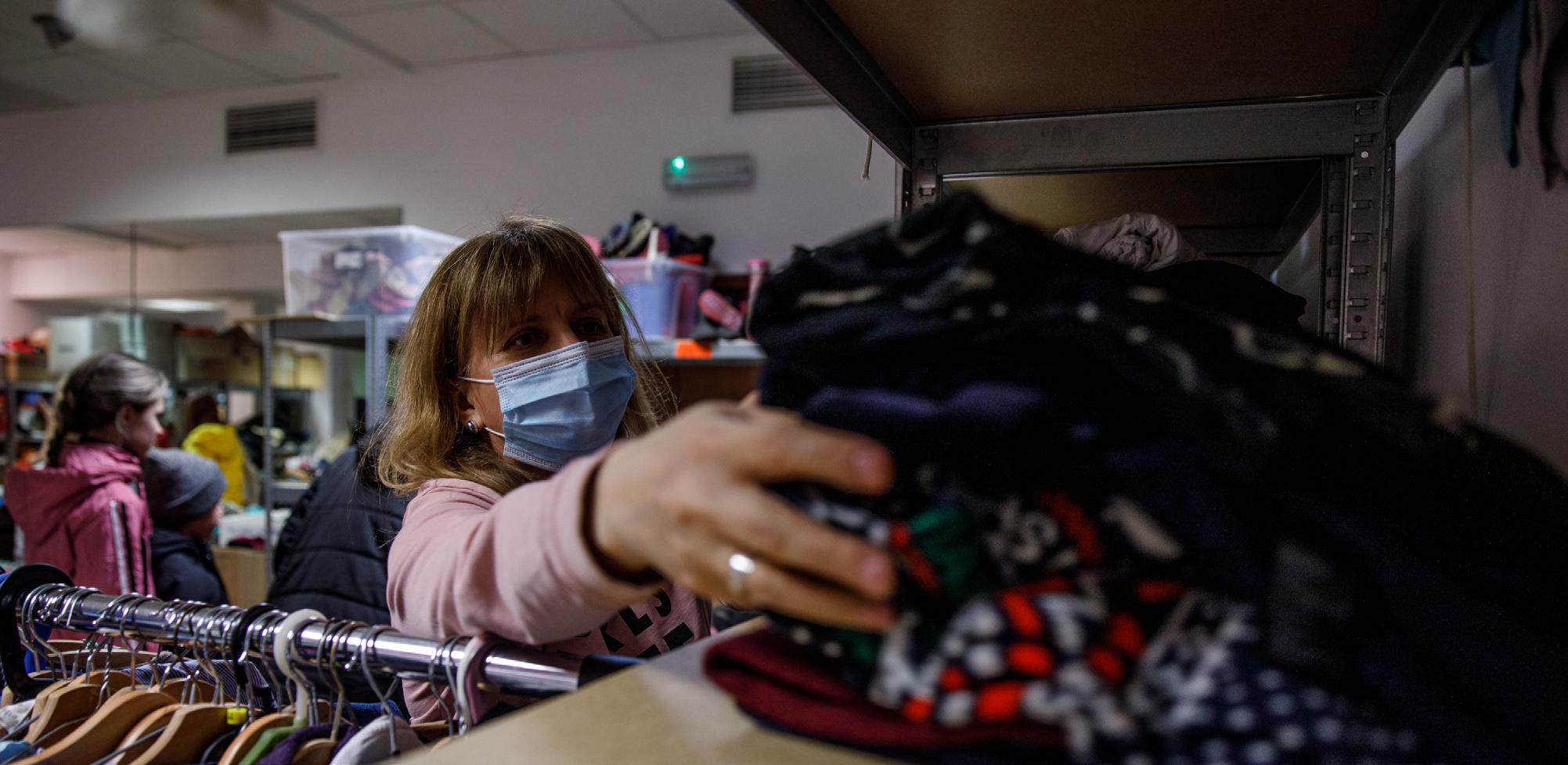
I translated and edited texts for the “Scouts 4 Scouts” system, consulted scout and guide meetings’ programmes on Ukraine for all age groups, co-created a collection of inspirations and resources, I was in contact with the management of the Association of Ukrainian Guides, recorded a Ukrainian language lesson and prepared its script, I did translations according to the current needs (e.g. announcements about summer camps) and I prepared an official translation of the name and abbreviation of ZHP into Ukrainian.
I am very grateful to all those who have been single-mindedly devoting to this service for so many months – your actions show that you are sensitive to the needs of people in crisis, you show great solidarity with the victims of the war and the refugees. I took a mother with four children in for four months and I am aware that all the organised activities, collected donations, every picnic for children, and a smile and a kind word from the person in the help point is precious for those in need.
Radecka Krakow-Podgórze District Krakow Region
27
Aniela
As the Tarnowskie Góry ZHP Paramedics Club we were invited by the Polish Red Cross Krakow to operate at the old railway station in Krakow and its vicinity. We were on duty at the medical point, mainly on 24-hour shifts during the weekends. Together with medical staff we were providing first aid, helping to transport patients to medical facilities, treating minor wounds and providing psychological support to refugees.
Our paramedics together with scouts and guides from our district, in cooperation with Tarnowskie Góry Municipal Social Welfare Centre, created warehouses for the products that were the most needed, and they segregated the packages, helped with handing out products and made packages that were then sent in humanitarian convoys. During the refugees’ stay in the temporary shelters, paramedics offered medical assistance and tested the newcomers for COVID-19. Until May we also dealt with segregating medications which were cyclically coming from abroad and were then sent to the border.
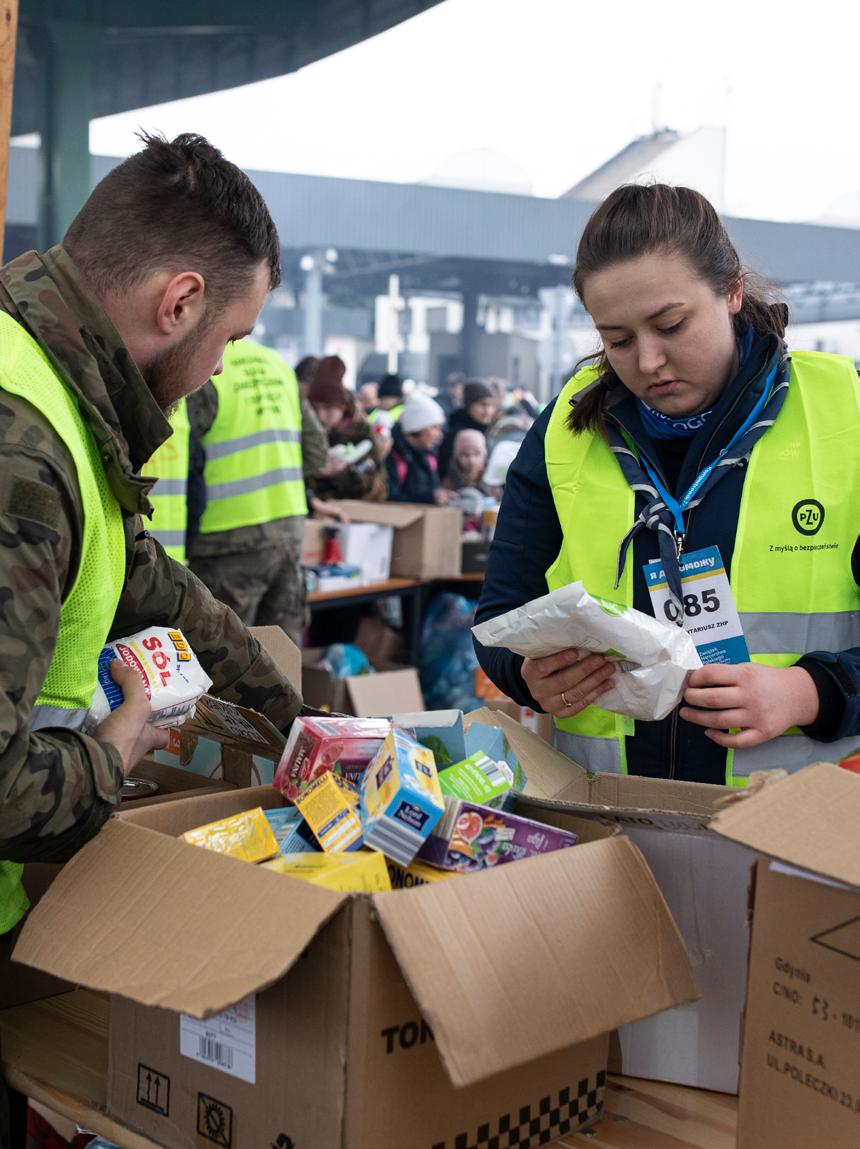
We believe that it was an intense time that caused a great sense of mobilisation, empathy and humility in all of us. We are grateful that we could be part of this little spark of help.
Michał Trybus Tarnowskie Góry District Silesia Region
The Kuyavia-Pomerania Region carried out assistance activities for the Ukrainian nation on almost all levels, starting from ongoing cooperation with the local government and municipal and national services, through donations collections, carrying out the service at the border, to arranging programme activities. Already in the first days after the outbreak of the war we created a donations warehouse, where we collected, sorted and packed all vital products. We organised several transports to Ukraine, to Lviv and a bit further to Ukrainian collection points.
Scouts and guides were also active in the local help points, information points, and served at railway stations. We worked closely with the Crisis Management Department and the provincial office. We provided equipment bases for refugees, and our regional centres were included on the list of available accommodations. We took into our centres the evacuated people: people with disabilities, mothers with children and Roma families from Ukraine. The refugees have been living in our water activity centre HOW Smerzyn to this day, and some of them even found new jobs there. We also tried
to support refugees with organising different programme activities. We held workshops for the youngest, integration and educational meetings, supported their acclimatisation at schools, invited them to scout and guide meetings. We carried out the “Box of Joy” campaign, collecting shoe boxes with specific contents of basic things for children (a cuddly toy, something sweet, a box of juice, a game, a notebook and crayons plus a few more things for children). We also developed “Chat” cards with basic phrases and questions for the first contact. We hosted Ukrainian children at our regular meetings and then camps during this year’s summer. We organised a camp for 40 children from Ukraine – the Polish-Ukrainian Scout and Guide Summer. And for our younger and older scouts and guides, as well as leaders, we prepared the regulations for obtaining a special badge connected with helping Ukraine.
Dorota Sucharska Bydgoszcz-Miasto District Kuyavia-Pomerania Region
28
COOPERATION WITH UNICEF
As the time passed, our service became more and more organised. One example of this is ZHP’s cooperation with UNICEF. The project we have been carrying out involves actions in 9 countries – the largest one is in Poland and it includes most of the activities.
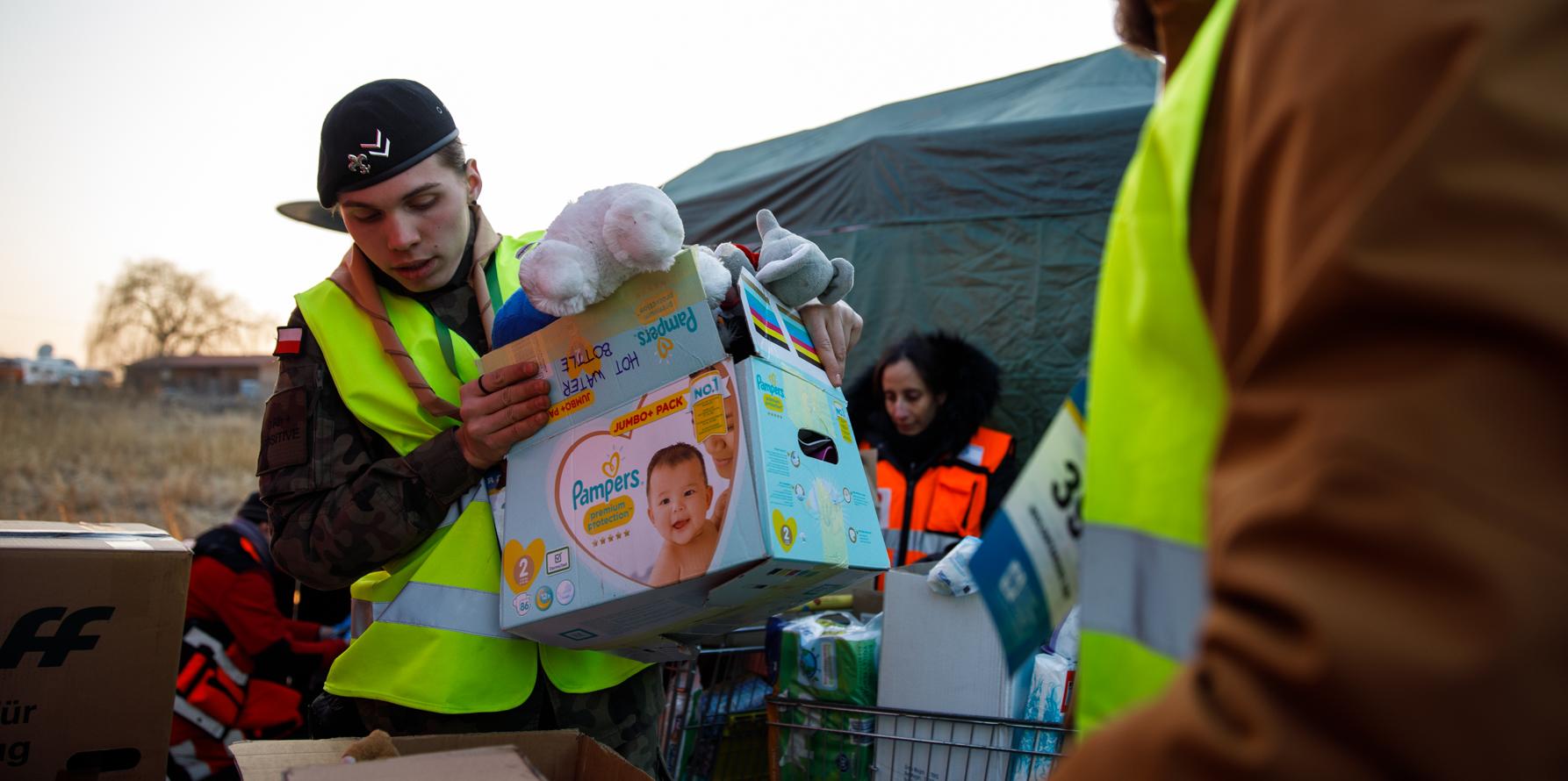
THE PROJECT IS DIVIDED INTO THREE AREAS:
• Short term support – Blue Dots
• Medium-term support – supporting ZHP units in organising camps for children of war refugees and provide the appropriate training
• Long-term support – supporting a lasting integration within the scout units (psychological support, staff training, programme support, involvement in ZHP events, promotion of the WOSM programmes)
29
BLUE DOTS
“Blue Dots” Child Protection and Family Support Centres provide a minimum set of key child protection and social services. “Blue Dots” centres operate in cooperation with UNICEF and other partners, e.g. local governments. Blue Dots also play a key role in providing refugees with reliable, up-to-date and accurate information, including information about services, documentation and family reunification. It is provided through multiple channels, in an accessible and child-friendly formats, in different languages and online/digitally.
Blue Dots are places where professional social work ers, psychologists, counsellors and legal advisors are available to support the identification of urgent social welfare and protection needs of children and young people and ensure that these needs are met. They can also provide support to other people with special needs, including victims of gender-based violence and people with disabilities.
Blue Dots already operate in Medyka, Przemyśl and Krakow. There are plans to open further points in Warsaw and Chełm, among others.
Each day at Blue Dot is different, each person comes with a different issue. There are mothers with children, elderly people. They attend to administrative matters, seek legal advice. The staff is made up entirely of Ukrainian girls who had to flee their homeland themselves – therefore there is a lot of empathy and understanding in their actions, you can see their commitment and willingness to help. In the more complex cases, they come to me or Dominika (second coordinator) and we look for a solution together. At first there was confusion – no one was prepared for this kind of situation. Many things had to be dealt with quickly, on the spot, and sometimes you had to look for some temporary solutions. We never lacked people in need of help, but also volunteers and donors. Over time, it was possible to arrange and coordinate it. Children at the point can play and colour in peace. Each person who visits us has their own story, most of them include looking for a safe place.
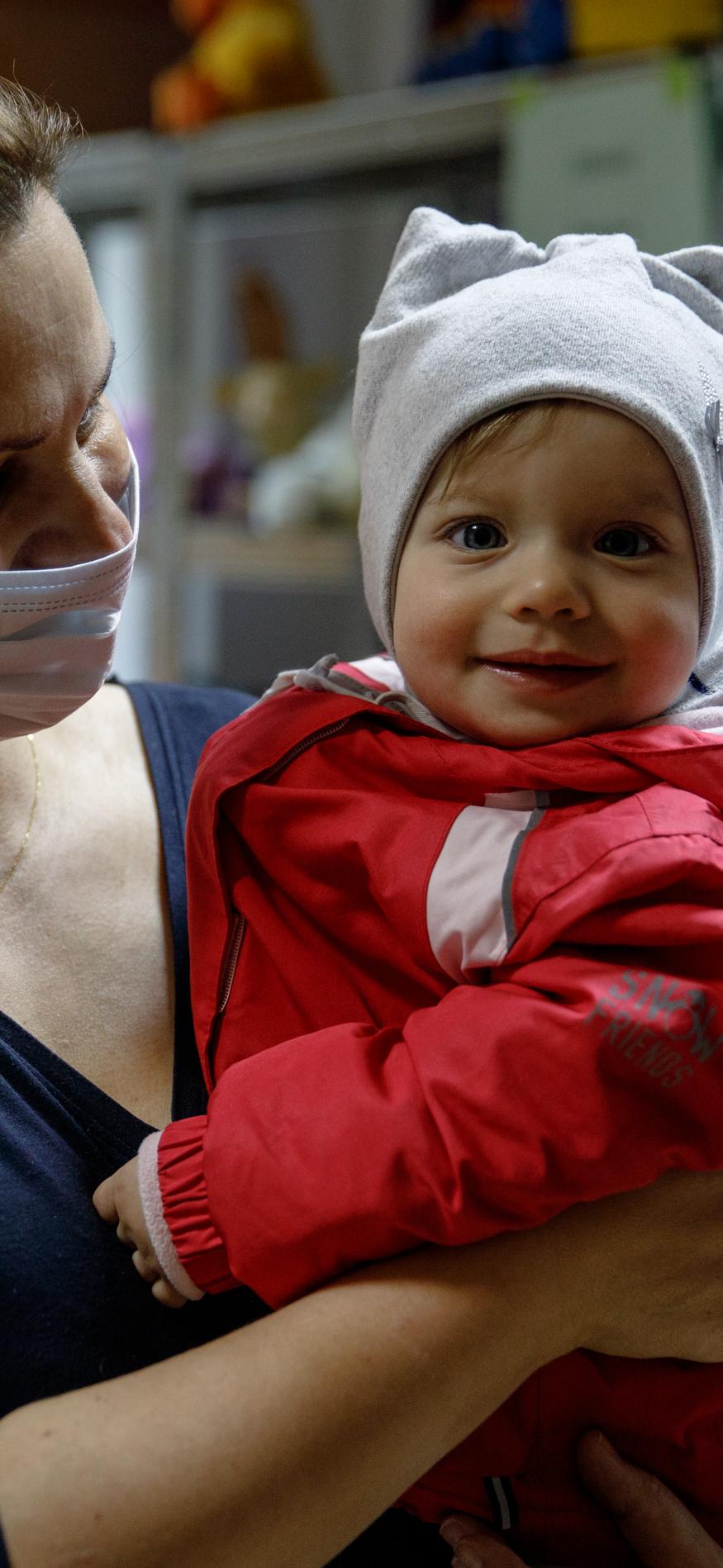
30
The UNICEF point is usually just a stopover. Sometimes the only way we can help is by giving information, but maybe it is more than enough because it may prove crucial in the current situation. It’s about where it is safe to stay for the night, where you can eat a hot meal, when the train to a particular city leaves. Those small things take on a completely different meaning in the face of the ongoing war in Ukraine. The joy comes from finding a bandura rack left in a hurry at the previous station, checking in for a flight to Dublin, a SIM card brought from Ukraine, an organised hotel accommodation
or two peaceful days. The sense of satisfaction comes when the emotions (and there are always plenty of them) subside after each conscientiously performed task.
CO-FINANCING SUMMER AND WINTER CAMPS
A very important element of the project is financial support dedicated to the organisation of summer and winter camps for children and youth from Ukraine. Thanks to the project, about 6,000 children from Ukraine took part in the camps, and the plans for the winter holidays include inviting 3,000 young refugees and internally displaced people to participate in the Polish-Ukrainian integration winter camps.
Camp time is an opportunity for learning to be tolerant, for integrating with peers and the education in the spirit of open-mindedness and intercultural friendship, as well as an opportunity to break away from the difficult experiences of the past weeks and months.
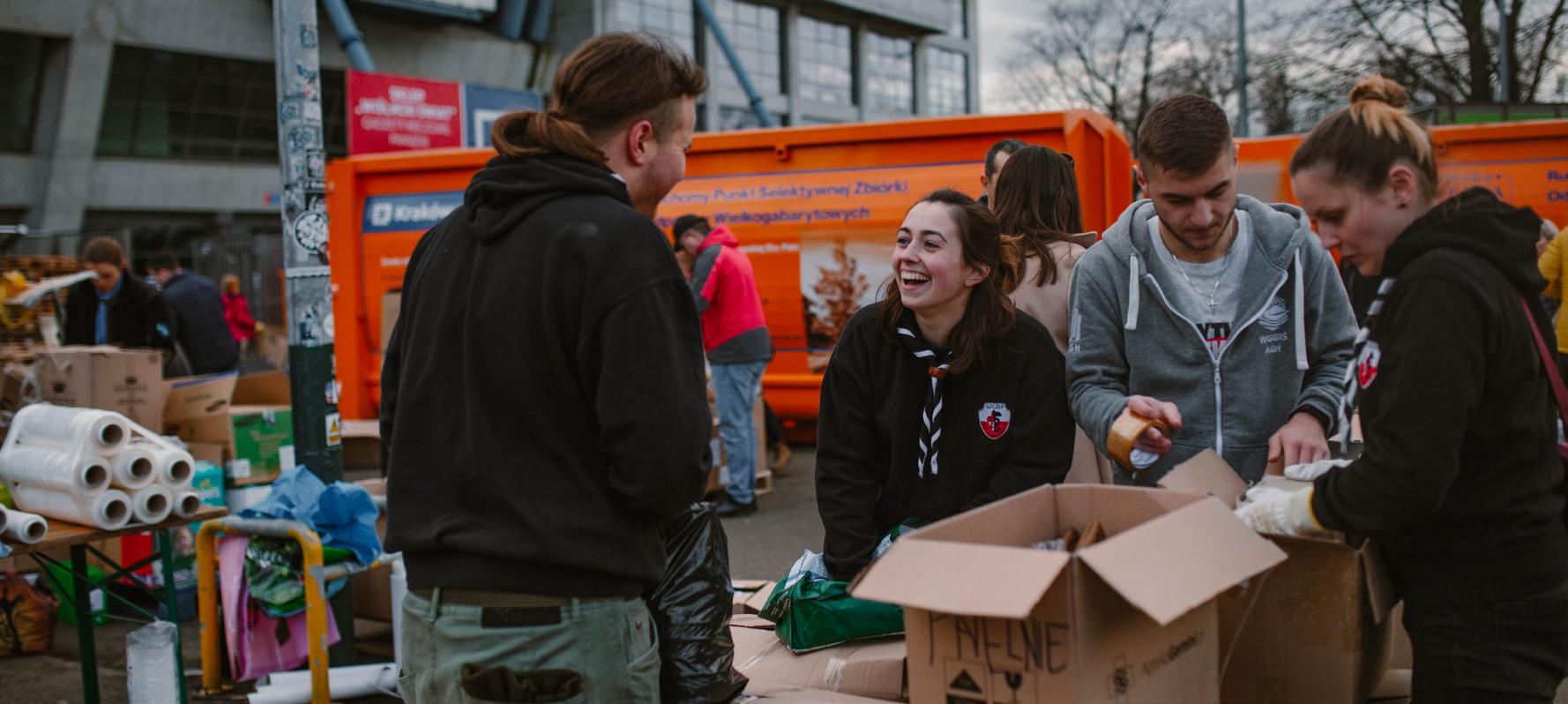
31
Krzysztof Mitka Krzeszowice District Krakow Region
TRAINING
As part of the UAct project, there are supportive trainings for scout leaders and volunteers of our organisation. They serve to support the permanent integration in scout units.
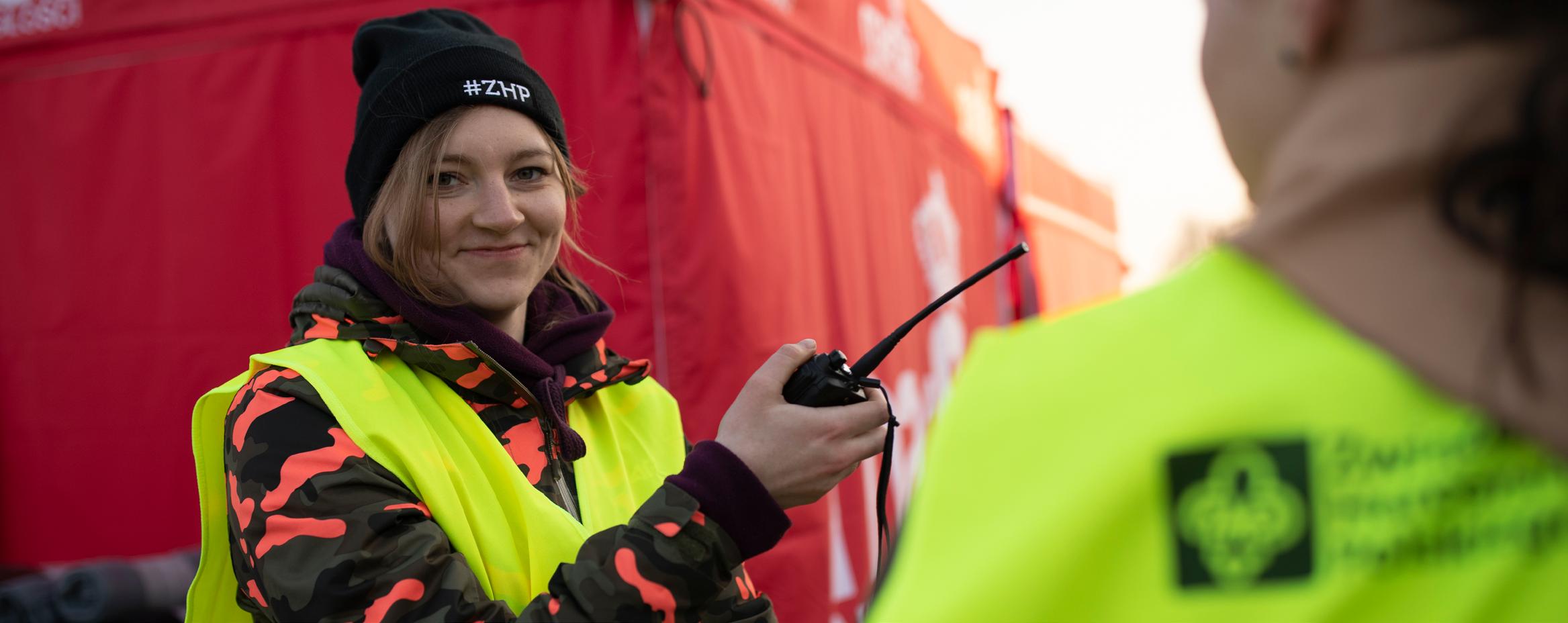
During the summer we organised trainings that were conducted in cooperation with UNICEF Polska and WOSM. The trainings concerned first psychological aid, the Safe from Harm policy of counteracting violence against children and youth, and the Ureport tool. During the workshops the participants gained knowledge on how to act in difficult situations at camps or during the regular activities of scout units, and how to support children from Ukraine who had been through a lot in the previous months. Ureport is a communication tool designed for young people which supports community activities. The tool is available in WhatsApp and Telegram messengers. Ureport is a key communicator for sharing information, raising awareness and collecting quantifiable data on areas affecting children, including those in vulnerable situations. In Europe, the tool became especially useful due to the war in Ukraine. Refugees can
easily obtain information about the current situation in the country in which they are staying, or obtain guidance in a language they understand. The role of trained instructors is to promote this tool among friends and pupils, so that it reaches as many people who need it as possible. All throughout the year we are conducting a series of trainings on the integration of children from Ukraine in packs and units. We want these trainings to be conducted by practitioners, people who are already working in their units with an international composition.
At the end of November we started another series of trainings – this time addressed to the staff of the Polish-Ukrainian integration winter camps. By the end of January we plan to train a total of over 500 scout leaders who have direct contact with Ukrainian children and youth during their units’ activities.
32
Agata Królak
THANK YOU!
To everyone involved in the service, and those who supported our actions.

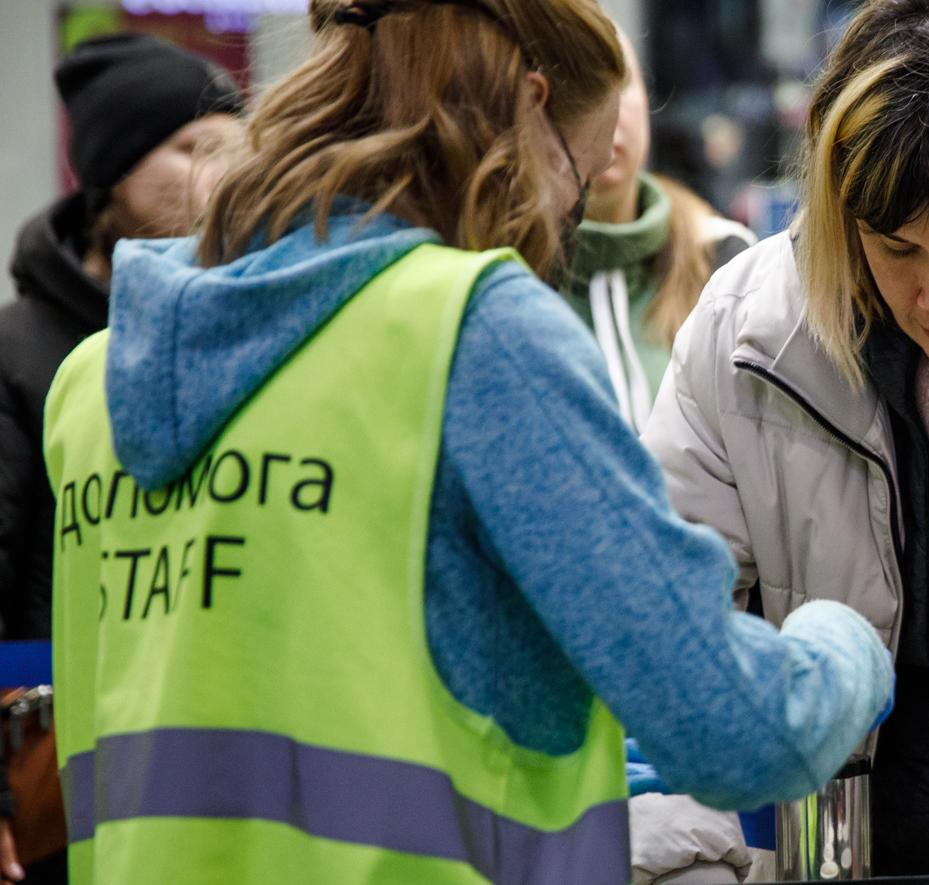
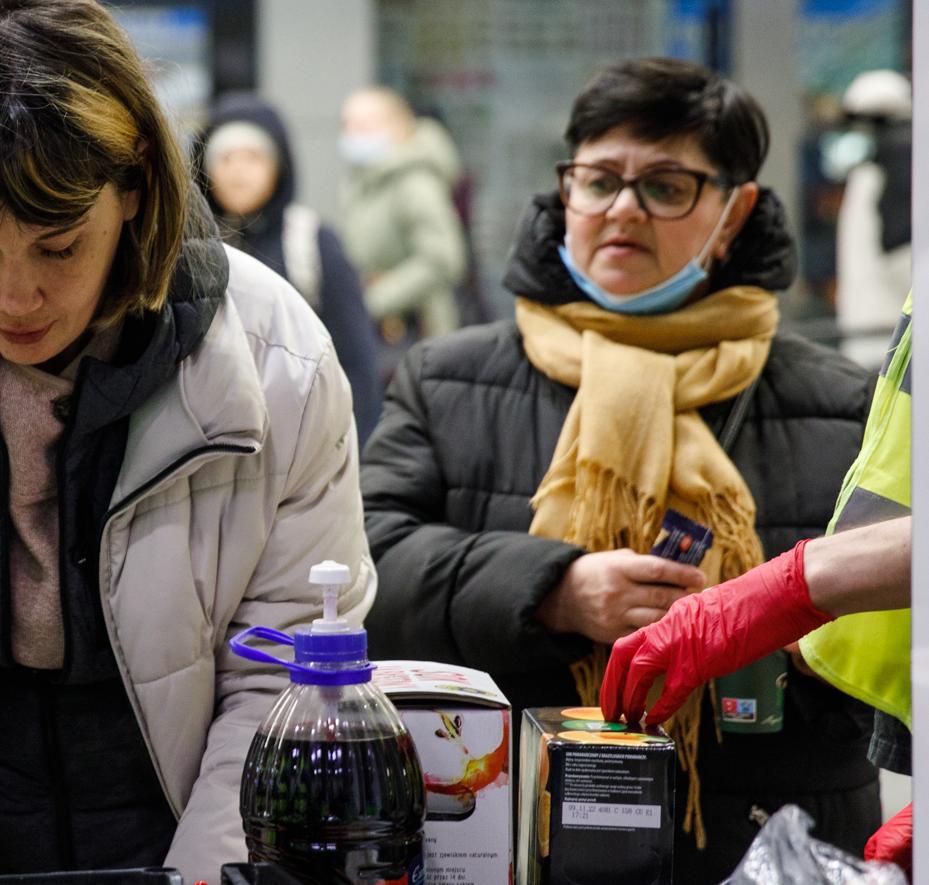















 Maja Florczak Opole District Opole Region
Maja Florczak Opole District Opole Region



 Anna Wasilewska Sochaczew District Mazovia Region
Anna Wasilewska Sochaczew District Mazovia Region

 Suder Końskie District Kielce Region
Suder Końskie District Kielce Region










